AP PGLCET 2023 LLM 2 Years Question Paper with Solution pdf is available for download. The exam was conducted by Acharya Nagarjuna University, Guntur on behalf of APSCHE on May 20, 2023 in Shift 2. The question paper comprised a total of 120 questions.
Check AP PGLCET Question Paper 2025 with Solution PDF
AP PGLCET 2023 LLM 2 Years Question Paper with Answer Key PDFs
![]()
AP PGLCET 2023 Questions with Solutions
Question 1:
Who coined the expression 'Legal Theory'?
- (A) Julius Stone
- (B) Salmond
- (C) Friedman
- (D) Keeton
Question 2:
Who defined jurisprudence as formal science of positive law?
- (A) Ulpian
- (B) Bentham
- (C) Austin
- (D) Holland
Question 3:
Paton described Realism as left wing of
- (A) Analytical School
- (B) Historical School
- (C) Philosophical School
- (D) Sociological School
Question 4:
According to declaratory theory of precedent, judges are
- (A) Law makers
- (B) Law creators
- (C) Law finders
- (D) Law inventors
Question 5:
According to Salmond, custom is
- (A) Formal source
- (B) Literary source
- (C) Historical material source
- (D) Legal material source
Question 6:
Of theories of corporate personality, the German jurist Dr. Gierke is the leading exponent of
- (A) Realist theory
- (B) Fiction theory
- (C) Bracket theory
- (D) Concession theory
Question 7:
Which of the following is not a characteristic of legal right?
- (A) Subject matters of right
- (B) Person of inheritance
- (C) Person of incidence
- (D) Novation of right
Question 8:
Res nullius rule implies
- (A) A right of easement acquired after a passage of time prescribed by law
- (B) Owner of a tree has the right to the fruits of the tree
- (C) For a previously ownerless object, who took it first became the owner
- (D) Acquiree
Question 9:
Ownership which is imperfect but capable of being made perfect on fulfillment of some condition is
- (A) Vested ownership
- (B) Trust ownership
- (C) Equitable ownership
- (D) Contingent ownership
Question 10:
The cancellation of the driving licence of a person is an example of
- (A) Preventive theory
- (B) Reformatory theory
- (C) Expiatory theory
- (D) Deterrent theory
Question 11:
Who said "Exclusiveness is the essence of possession"?
- (A) Savigny
- (B) Holland
- (C) Gray
- (D) Salmond
Question 12:
Who is considered as the father of English Jurisprudence?
- (A) Sir John Austin
- (B) Bentham
- (C) Salmond
- (D) None of the above
Question 13:
Which of the following Jurists has explained legal rights and duties in terms of Jural Co-relations and Jural Opposites?
- (A) Hohfeld
- (B) Holmes
- (C) Holland
- (D) Roscoe Pound
Question 14:
Ratio Decidendi of a case means
- (A) The final order of the Court
- (B) The underlying principle or legal reasons on which the result of the case depends
- (C) The judgment delivered by the court
- (D) That part of the judgment which has persuasive effect
Question 15:
Which one of the following writers is the leading exponent of the Analytical School of Jurisprudence?
- (A) Starke
- (B) Oppenheim
- (C) John Austin
- (D) Hobbes
Question 16:
Which one of the following writers was the founder of the Historical School of Jurisprudence?
- (A) Salmond
- (B) John Austin
- (C) Roscoe Pound
- (D) Savigny
Question 17:
A source of law which confers binding authority as a rule and converts the rule in law is called
- (A) A material source of law
- (B) A formal source of law
- (C) An absolute source of law
- (D) An informal source of law
Question 18:
Legal sources of law are those sources which are recognized as such by the law itself e.g.
- (A) Religion, history and precedent
- (B) Custom, treaty and religion
- (C) The statute law, custom and precedent
- (D) Treaty, convention and religion
Question 19:
A legal right possesses the following characteristics
- (A) Subject, Object, Matter of content, Acts and Title
- (B) Subject, Object, purpose, Title and Aim
- (C) Aim, purpose, long title, Short title and Act
- (D) Act, title, subject, object and purpose
Question 20:
A child in the mother's womb is by legal fiction regarded as already born. If he is born alive, he will have a legal status. Though law normally takes cognizance of living human beings yet the law makes an exception in case of an infant in
- (A) Nemo det quod non habet
- (B) En venture sa mere
- (C) Ubi jus ibi remedium
- (D) Vinculum juris
Question 21:
Preamble says that the Constitution was adopted on
- (A) \(26^{th}\) January 1949
- (B) \(26^{th}\) November 1949
- (C) \(26^{th}\) December 1949
- (D) \(26^{th}\) January 1950
Question 22:
Which one of the following is not an authority falling within the definition of 'State' under Article 12 of the Constitution?
- (A) Council of Scientific and Industrial Research
- (B) Indian Statistical Institute
- (C) Board of Control for Cricket in India
- (D) Bharat Petroleum Corporation
Question 23:
Article 1 (1) of the Constitution reads: India, that is Bharat, shall be
- (A) A Federation of States
- (B) A Union of States
- (C) A Federal Union
- (D) A Union of Centre, States and Union Territories
Question 24:
Which Article of the Constitution defines a Money Bill?
- (A) Article 109
- (B) Article 110
- (C) Article 111
- (D) Article 112
Question 25:
The Indian Parliament shall consist of
- (A) The House of the People
- (B) The Council of States
- (C) The Council of States and the House of the People
- (D) The President, the Council of States and the House of the People
Question 26:
A member of the state public service commission is removed from his office by
- (A) Governor of the State
- (B) President of India
- (C) Parliament
- (D) Legislative Assembly
Question 27:
The first constitutional amendment was challenged in the case
- (A) Sajjan Singh V. State of Rajasthan
- (B) Golaknath V. State of Punjab
- (C) Sankari Prasad V. Union of India
- (D) Keshavananda Bharti V. State of Kerala
Question 28:
Proper respect is shown to national anthem by standing up when the national anthem is sung. It will not be right to say that disrespect is shown by not joining in the singing. It has been held in:
- (A) Bijo Emmanuel v. State of Kerala
- (B) Surya Narain v. Union of India
- (C) Ram Jawaya Kapur v. Union of India
- (D) State of Rajasthan v. G. Chawla
Question 29:
Appellate jurisdiction of the supreme court in appeals from high courts in regards to civil matters pertain only to a
- (A) Question of law
- (B) Substantial question of law
- (C) Question of fact
- (D) Both question of fact and law
Question 30:
Amendment incorporated Ninth Schedule of Indian Constitution.
- (A) First Amendment
- (B) Second Amendment
- (C) Third Amendment
- (D) Fourth Amendment
Question 31:
"Preamble is a key to open the mind of the makers" said in
- (A) Keshavanandhabharati's case
- (B) Benbarri case
- (C) Shankari Prasad's case
- (D) Minerva Mills case
Question 32:
Who tests the restrictions placed on Fundamental rights?
- (A) Parliament
- (B) President
- (C) Supreme Court
- (D) Prime Minister
Question 33:
Who of the following is legal person?
- (A) The Prime Minister of India
- (B) A firm of partners
- (C) The Government of India
- (D) None of the above
Question 34:
Fundamental Rights under Articles 20 and 21 are enforceable during the operation of emergency through Amendment Act
- (A) \(44^{th}\)
- (B) \(46^{th}\)
- (C) \(45^{th}\)
- (D) \(48^{th}\)
Question 35:
If a person is not the member of either house of Parliament, he cannot be appointed as a minister at the Centre for a period more than
- (A) 1 month
- (B) 6 months
- (C) 3 months
- (D) It is not essential to be a member of either house to remain a minister
Question 36:
Judicial Review is device to check arbitrary power of the
- (A) Executive
- (B) Judiciary
- (C) Legislature
- (D) Press
Question 37:
A writ which is the form of a command is
- (A) Quo Warranto
- (B) Prohibition
- (C) Mandamus
- (D) Certiorari
Question 38:
Which one of the following is not mentioned in the Constitution?
- (A) Administrative Tribunal
- (B) Political party
- (C) Cabinet
- (D) No-confidence Motion
Question 39:
Which is the only State of India to have the common Civil Code?
- (A) Jammu and Kashmir
- (B) Mizoram
- (C) Nagaland
- (D) Goa
Question 40:
In the NJAC case, the Supreme Court struck down the \(99^{th}\) Constitutional Amendment on the ground that it violated the basic constitutional feature of
- (A) Rule of Law
- (B) Separation of Powers
- (C) Judicial Independence
- (D) Legislative Sovereignty
Question 41:
International Law can be applied in the field of Municipal Law only when Municipal Law either permits it or adopts it specifically
- (A) Correct
- (B) Incorrect
- (C) Partly correct
- (D) Partly incorrect
Question 42:
Who is called as the father of International law
- (A) Bentham
- (B) Hugo Grotius
- (C) Oppenheim
- (D) Suez
Question 43:
Which year was the United Nations established
- (A) 1967
- (B) 1976
- (C) 1945
- (D) 1942
Question 44:
Res judicata is a part of general principles of law. It was held in
- (A) Mavrommatis Palestine concessions case
- (B) N. Administrative Tribunal case
- (C) S. Lotus case
- (D) Serbian and Brazillian loan case
Question 45:
According to which theory of recognition, recognition is a political and discretionary act
- (A) Monistic Theory
- (B) Constitutive theory
- (C) Declaratory theory
- (D) Facultative theory
Question 46:
The words 'international law' used for the first time by
- (A) Hall
- (B) Hobbes
- (C) Oppenheim
- (D) Jeremy Bentham
Question 47:
The expression 'International Law' was coined by
- (A) Grotius
- (B) Bentham
- (C) Holland
- (D) Oppenheim
Question 48:
Who described International Law as merely a positive morality?
- (A) Grotius
- (B) Bentham
- (C) Austin
- (D) Kelsen
Question 49:
Treaty, generally speaking, binds States which are parties to the treaty. A State becomes party to the treaty by
- (A) Signing the treaty
- (B) Ratifying the treaty
- (C) Enforcing the treaty
- (D) Enacting domestic legislation to implement the treaty
Question 50:
In International Law, which of the following territories will be considered as 'terra nullius' territory?
- (A) Outer space
- (B) Territory subjected to the sovereignty of the State
- (C) A newly formed volcanic island on the high seas
- (D) The area consisting of deep seabed and ocean floor
Question 51:
Which one of the following is not a maritime zone under 1982 UN Convention of the Law of the Sea?
- (A) Contiguous Zone
- (B) Exclusive Economic Zone
- (C) Inclusive Deep Seabed
- (D) Internal Waters and Archipelagic Waters
Question 52:
An accused is extradited for a particular crime and the country which gets back the criminal is entitled to prosecute that person only for the crime for which he was extradited. This is known as
- (A) Rule of peculiarity
- (B) Rule of specialty
- (C) Rule of specificity
- (D) Attendant clause
Question 53:
In which case the ICJ held that warship have right to innocent passage through international straights in time of undeclared war as well as in peace time.
- (A) Corfu Channel Case
- (B) SS Lotus case
- (C) North Sea Continental Shelf case
- (D) Right to Passage case
Question 54:
Recognition de jure implies:
- (A) International Court of Justice gives recognition
- (B) The recognized state fulfils the requirement laid down under the international law
- (C) That the state fulfills the above requirement in fact
- (D) That the state is recognized by the neighboring state
Question 55:
The quorum of the International Court of Justice is
- (A) 10 Judges
- (B) 9 Judges
- (C) 7 Judges
- (D) 8 Judges
Question 56:
ILO was originally an organ of
- (A) UNO
- (B) IMF
- (C) League of Nations
- (D) GATTSS
Question 57:
Frustration of contract implies
- (A) Commercial hardship
- (B) Physical impossibility due to disappearance of the subject-matter of the contract or the object has failed to materialize
- (C) Both (a) and (b)
- (D) None of the above
Question 58:
A party to a contract can be discharged from performing it, if it has become
- (A) Expensive
- (B) Onerous
- (C) Commercially inviable
- (D) Impossible
Question 59:
Every promise and every set of promises, forming the consideration for each other, is an
- (A) Agreement
- (B) Contract
- (C) Obligation
- (D) Lawful promise
Question 60:
A proposal when accepted becomes a
- (A) Promise
- (B) Contract
- (C) Offer
- (D) Acceptance
Question 61:
Consideration should be something in return of promise which
- (A) Both the law and parties regard, as having some value
- (B) Only law regards as having some value
- (C) Only parties regard some value
- (D) Only adequate value necessary
Question 62:
Contract Act, 1872 doesn't include
- (A) Social agreements
- (B) Commercial agreement
- (C) Domestic Agreement
- (D) a \& c
Question 63:
Promises which form the consideration or part of the consideration for each other are called
- (A) Reciprocal promises
- (B) Cross offer
- (C) Conditional offer
- (D) Conditional promises
Question 64:
Under the Indian Contract Act, 1872 which is one of the following does not fall in the meaning of fraud
- (A) Active concealment of a fact
- (B) Suggesting, as a fact, of that which is not true, by one who does not believe it to be true
- (C) Positive assertion of unwarranted statements
- (D) A promise made without any intention of performing it
Question 65:
Which of the following sections of Indian Contract Act, 1872 states, "In order to convert a proposal into a promise, the acceptance must be absolute and unqualified
- (A) Section 6
- (B) Section 8
- (C) Section 5
- (D) Section 7
Question 66:
Claim for necessaries of life supplied to a lunatic under section 68
- (A) Can be enforced against the lunatic's property
- (B) Can be enforced against the lunatic personally when he ceases to be lunatic
- (C) Cannot be enforced against the lunatic or his estate
- (D) Can be enforced against the guardian of the lunatic
Question 67:
In case of breach of contract, compensation can be claimed under section 73
- (A) For remote consequence of the breach
- (B) For the proximate and natural consequences of breach
- (C) For direct consequences of the breach
- (D) For indirect consequences of the breach
Question 68:
'A' promises to make a sculpture for 'B'
- (A) 'A' must perform this promise personally
- (B) A's son can perform the promise
- (C) A's servant can perform the promise
- (D) A's employer can perform the promise
Question 69:
On attaining the age of majority, a minor's agreement
- (A) Becomes valid
- (B) Becomes void
- (C) Can be ratified by him
- (D) Cannot be ratified by him
Question 70:
Where consent is caused by fraud or misrepresentation, the contract is
- (A) Unenforceable
- (B) Void
- (C) Voidable at the option of the aggrieved party
- (D) Not affected in any manner
Question 71:
The age of majority for the purpose of the Indian Contract Act is
- (A) 16 years
- (B) 18 years
- (C) 21 years
- (D) 18 years for girls and 21 years for boys
Question 72:
Owing to strike in the factory of X, he is not able to supply the goods to Y as per the terms of the agreement. The agreement in such a case
- (A) Is discharged
- (B) Is not discharged
- (C) Is not discharged
- (D) Is voidable at the option of X
Question 73:
An intention to close down any establishment under Section 25 FFA requirement is Notice
- (A) At least 60 days before the date on which the intended is to become effective
- (B) At least 30 days before the date on which the intended is to become effective
- (C) At least 90 days before the date on which the intended is to become effective
- (D) At least 100 days before the date on which the intended is to become effective
Question 74:
Which of the following is not a right of an incorporated trade union
- (A) Perpetual succession
- (B) Common seal with power to acquire and hold movable and immovable property
- (C) Cannot sue or be sued on the name of trade union
- (D) None of the above
Question 75:
Which Labour Legislation has been enacted on the basis of Right to Association?
- (A) Minimum Wages Act
- (B) Payment of Wages Act
- (C) Trade Unions Act
- (D) Industrial Disputes Act
Question 76:
Which one is not a right of a recognized union?
- (A) A right of 'Check-off'
- (B) To use notice board on the premises of the undertaking
- (C) To appear on behalf of the union in domestic inquiry
- (D) Inspecting the undertaking
Question 77:
A trade union might be in certain circumstances be an industry -
- (A) Des Raj V. State of Punjab
- (B) Vasudev V. State of Maharastra
- (C) Bangalore Water Supply Case
- (D) Gujarat Majdur Sabha Case
Question 78:
Which of the following is an object on which general funds could be spent as per section 15 of the Trade Union Act, 1926?
- (A) Payment to buy goods required for the enterprise
- (B) Payment of employees in the factory establishment
- (C) The payment of expenses for the administration of trade union or any member thereof
- (D) Payment to buy goods required for the factory establishment
Question 79:
How many members should sign the notice of dissolution?
- (A) 5 members and the secretary of the trade union
- (B) 10 members and the secretary of the trade union
- (C) 20 members and the secretary of the trade union
- (D) 7 members and the secretary of the trade union
Question 80:
As per the Trade Unions Act, 1926, a person may be admitted to membership of the Union on attaining-
- (A) 15 years of age
- (B) 14 years of age
- (C) 16 years of age
- (D) 18 years of age
Question 81:
Which of the following is machinery for settlement of industrial disputes?
- (A) Indian Labour Conference
- (B) Joint Management Council
- (C) Industrial Tribunal
- (D) Standing Labour Committees
Question 82:
Definition of workman is defined in
- (A) Section 2(s) of ID Act, 1947
- (B) Section 2(1) of IRC, 2020
- (C) Section 2(j) of ID Act, 1947
- (D) Section 2(m) of ID Act, 1947
Question 83:
With regard to the reference of industrial disputes under Section 10 of the Industrial Disputes Act, 1947, which of the following statements is correct-
- (A) It is a judicial act
- (B) It is an administrative act
- (C) It is a quasi-judicial act
- (D) It is a legislative act
Question 84:
With regard to the prohibition of lockout and strikes in Public Utility Services, which of the following sections are applicable to such services
- (A) Section 24 and 25 of ID Act, 1947
- (B) Section 22 and 23 of ID Act, 1947
- (C) Section 26 and 27 of ID Act, 1947
- (D) Section 21 and 23 of ID Act, 1947
Question 85:
Right to Strike in India is
- (A) Fundamental right
- (B) Statutory right
- (C) Both fundamental and statutory right
- (D) None of the above
Question 86:
The Trade Unions Act defines the expression 'Trade Union' in its
- (A) Section 2(e)
- (B) Section 2(f)
- (C) Section 2(g)
- (D) Section 2(h)
Question 87:
To be a member of a Trade Union, a person must attain the age of:
- (1) 15 years
- (2) 16 years
- (3) 18 years
- (4) 21 years
Question 88:
According to Section 9A of the Trade Unions Act, minimum requirement about membership of a trade union is
- (A) Seven
- (B) Ten percent or one hundred of the workmen
- (C) Ten percent or one hundred of the workmen whichever is less
- (D) Ten percent or one hundred of the workmen whichever is less subject to minimum seven
Question 89:
The criminal wrong is considered to be
- (A) Private wrong
- (B) Public wrong
- (C) Civil wrong
- (D) None of these
Question 90:
The criminal liability arises in
- (A) Involuntary act only
- (B) Voluntary acts only
- (C) External acts only
- (D) Internal act only
Question 91:
Which section is a key to the chapter, 'General-exceptions' and, thus in a way, controls the code?
- (A) Section 6 of IPC
- (B) Section 8 of IPC
- (C) Section 9 of IPC
- (D) Section 10 of IPC
Question 92:
C intentionally gives D a sword-cut or club-wound sufficient to cause the death of a man in the ordinary course of nature. D dies in consequence. Here.....
- (A) C is guilty of murder
- (B) C is guilty of culpable homicide
- (C) C has not committed any offence
- (D) C has committed a offence, which attracts no punishment
Question 93:
Punishment for rape is provided under of IPC.
- (A) Section 375
- (B) Section 376
- (C) Section 376A
- (D) Section 376B
Question 94:
How many persons are needed to call Robbery a Dacoity?
- (A) Five or more
- (B) Two
- (C) Five
- (D) Ten
Question 95:
Match List -I with List -II and select the correct answer by using the code given below lists
- (A) a-4, b-3, c-5, d-2
- (B) a-1, b-2, c-3, d-4
- (C) a-3, b-4, c-2, d-5
- (D) a-3, b-4, c-1, d-2
Question 96:
Respondent superior means
- (A) Let the principal be liable
- (B) Let the agent be liable
- (C) Let both of them be liable
- (D) Let none of them be liable
Question 97:
The following is not a good defence for tort of nuisance:
- (A) Acts done under statutory authority
- (B) Acts done for common benefit
- (C) Property is put to natural user of land
- (D) Act done for several years continuously for 20 years
Question 98:
Independent tort feasors
- (A) Are two or more persons acting independently concur to produce a single damage
- (B) Are two or more persons acting independently at the same time produce different damages
- (C) Are two or more persons acting independently at different times produce different damages
- (D) Are two or more person acting jointly at the same time produce different damages
Question 99:
Which of the following is false with respect to Section 34 of the Indian Penal Code?
- (A) It is only a rule of evidence
- (B) It does not create a distinct offence
- (C) It lays down a principle of liability
- (D) It is a penal provision
Question 100:
Life imprisonment means
- (A) Imprisonment for life
- (B) Imprisonment for 12 years
- (C) Imprisonment for 20 years
- (D) Imprisonment for 14 years
Question 101:
The general defences as provided in the Chapter of General Exceptions in the Indian Penal Code (IPC) can be pleaded
- (A) For IPC offences only
- (B) For IPC offences and offences under local law only
- (C) For IPC offences and offences under special law only
- (D) For IPC offences and offences under local or special law
Question 102:
Ubi jus ibi remedium means
- (A) Where there is a right, there is a remedy
- (B) Where there is a law. there is a remedy
- (C) Where there is a right. there is a writ
- (D) Where there is a remedy. there is a right
Question 103:
"Tortious liability arises from the breach of a duty primarily fixed by law; this duty is towards persons generally and its breach is redressible by an action for unliquidated damages." Who said this?
- (A) Salmond
- (B) Pollock
- (C) Kenney
- (D) Winfield
Question 104:
Application for copyright can be filed in
- (A) IP Office
- (B) Copyright Office
- (C) Civil Court
- (D) Department of trade
Question 105:
A patent right granted for an
- (A) Identification of source
- (B) Invention
- (C) Indication about quality
- (D) Good and service
Question 106:
Consumer Protection Act is significant to
- (A) Immovable Goods
- (B) Movable Goods
- (C) Particular Goods and Services
- (D) All Goods and Services
Question 107:
What is the time limit for filing a complaint under the Consumer Protection Act, 2019?
- (1) within one year
- (2) within two years
- (3) within three years
- (4) within ten years
Question 108:
Which of the following is know as Consumer disputes redressal agency?
- (A) District forum
- (B) State commission
- (C) National commission
- (D) All the above
Question 109:
Which one of the following statement is correct?
- (A) Copyright Law in India was governed by the Patent Act
- (B) Copyright Law in India was governed by the Trademarks Act
- (C) There was no Copyright Law in India prior to 1957
- (D) Copyright Law in India was governed by the Copyright Act 1914
Question 110:
Trade Related Aspects of Intellectual Property Rights Agreement came into force in which of the following years?
- (A) 1995
- (B) 2006
- (C) 1999
- (D) 2000
Question 111:
Which of these Conventions are known as the First Intellectual Property Treaty?
- (A) Paris Convention
- (B) Patent Co-operation Treaty
- (C) Patent Law Treaty
- (D) Berne Convention
Question 112:
What is considered as the Magna Carta of Environmental Protection?
- (A) Chipko movement
- (B) Stockholm declaration
- (C) Constitutional provisions of Environmental law
- (D) All the above
Question 113:
In which of the following, a person is constantly followed/chased by another person or group of several peoples?
- (A) Phishing
- (B) Bulling
- (C) Stalking
- (D) Identity theft
Question 114:
Which of the following are famous and common cyber-attacks used by hackers to infiltrate the user's system?
- (1) Dos and Drive-by Downloads
- (2) Malware \& Malvertising
- (3) Phishing and Password attacks
- (4) All of the above
Question 115:
Research is related with
- (A) Discovery of Ideas
- (B) Solution of a problem
- (C) Investigation of a problem
- (D) All of the above
Question 116:
What is the purpose of doing research?
- (A) To identify problem
- (B) To find the solution
- (C) Both A and B
- (D) None of the above
Question 117:
The experimental study is based on
- (A) The manipulation of variable
- (B) Conceptual parameters
- (C) Replication of research
- (D) Survey of literature
Question 118:
"A systematic step-by step procedure following logical process of reasoning" called
- (A) Experiment
- (B) Observation
- (C) Deduction
- (D) Scientific method
Question 119:
The Right to Information Act, 2005 provides that 'subject to the provisions of this Act, all citizens shall have the right to information' in its
- (A) Section 3
- (B) Section 4
- (C) Section 5
- (D) Section 6
Question 120:
Research based on observed and measured phenomena and deriving knowledge from actual experience rather than from theory or belief is
- (A) Empirical research
- (B) Theoretical research
- (C) Conceptual research
- (D) Fundamental research
AP PGLCET Previous Year Question Paper with Answer Key PDFs
Similar Law Exam Question Papers:

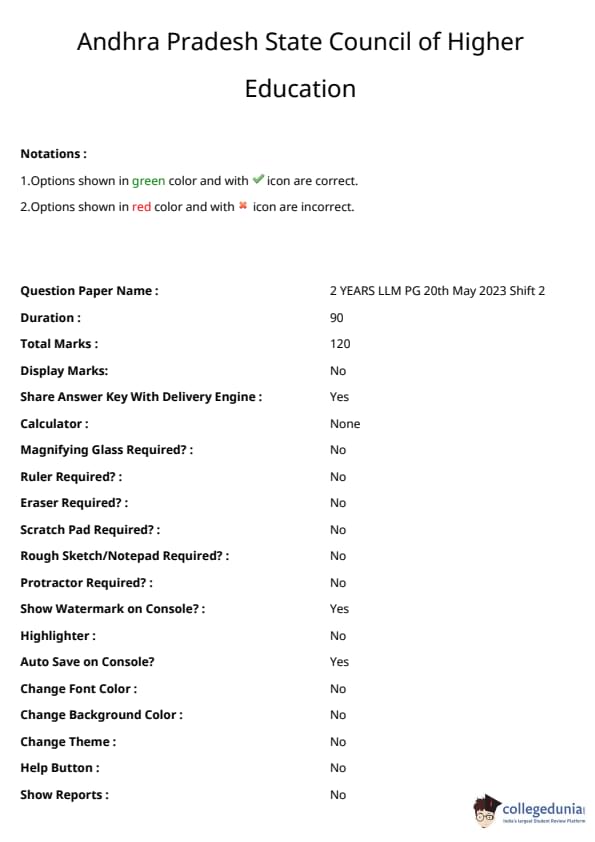
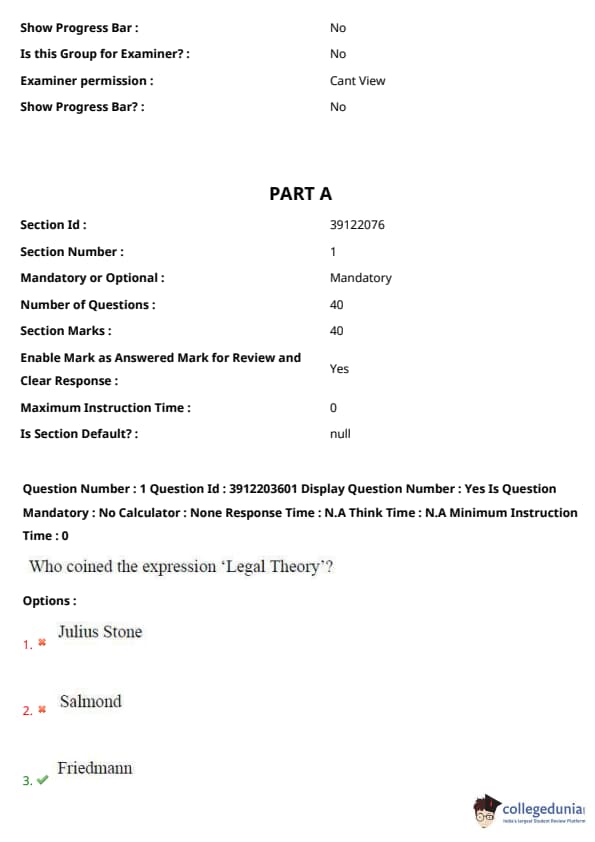
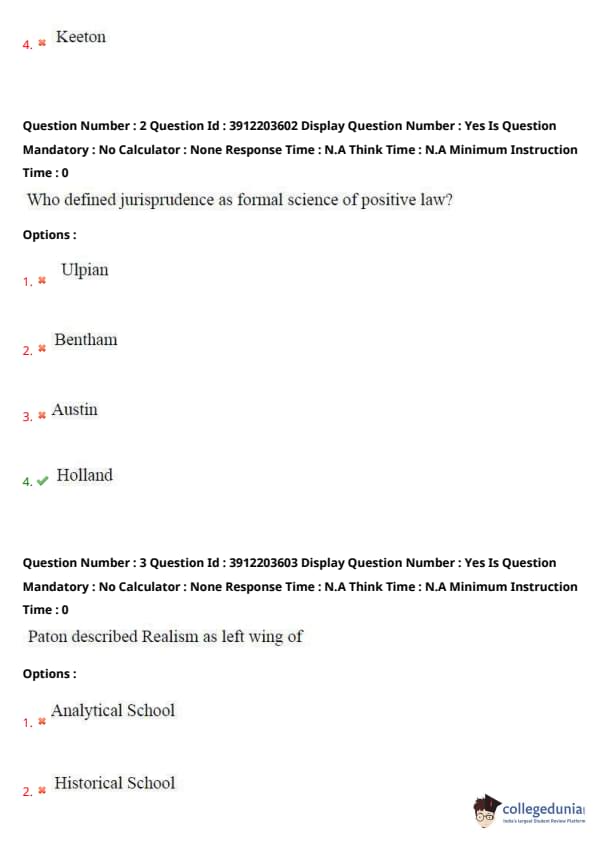
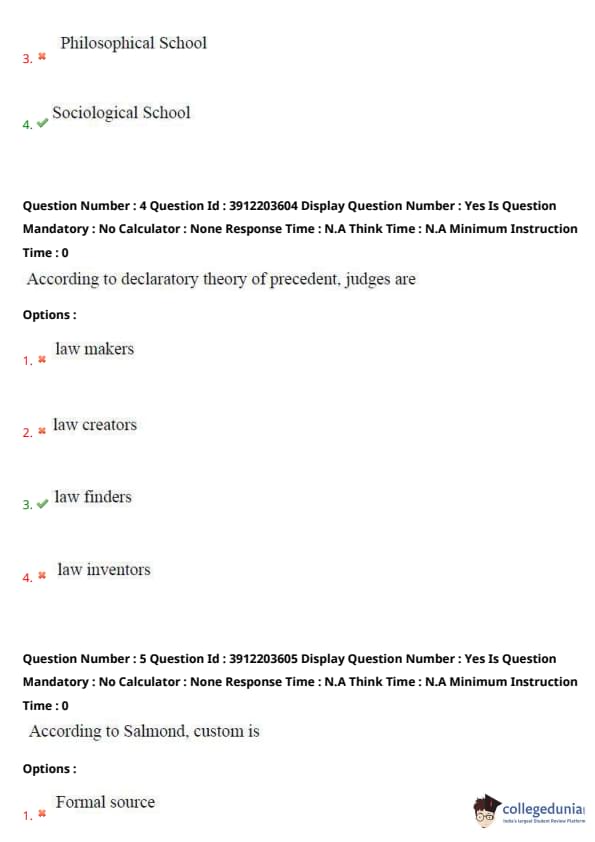
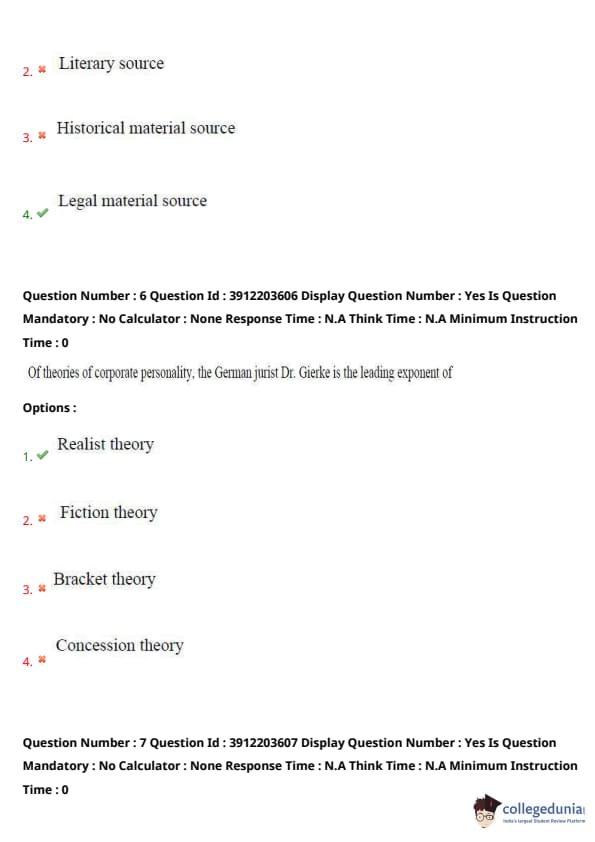
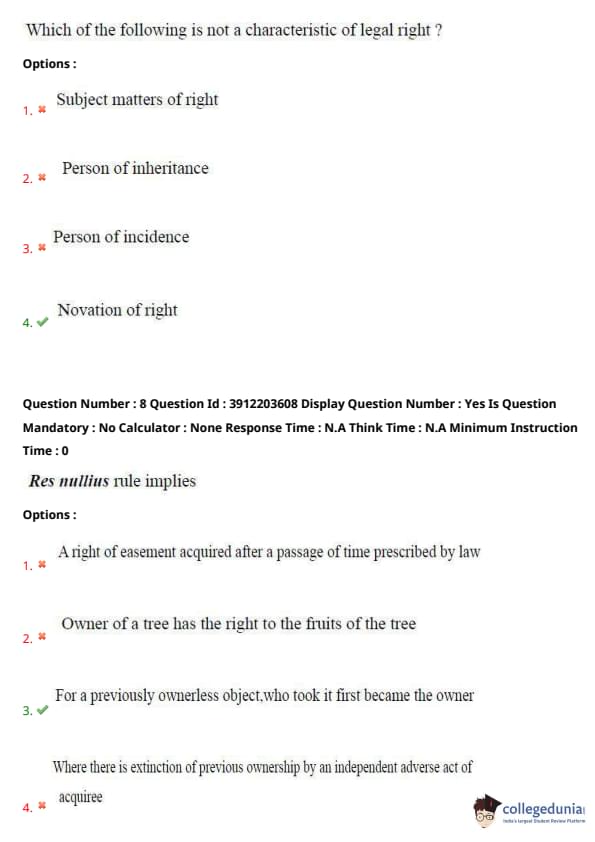
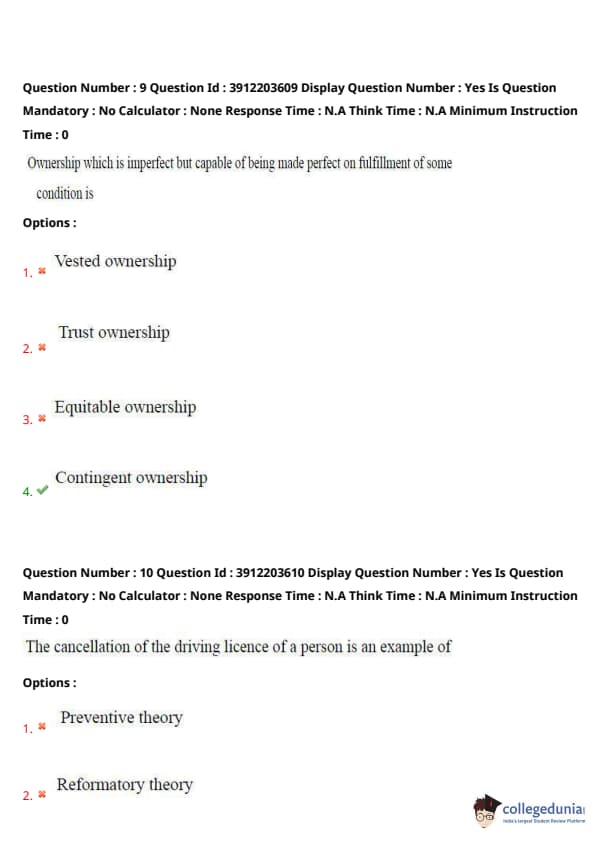
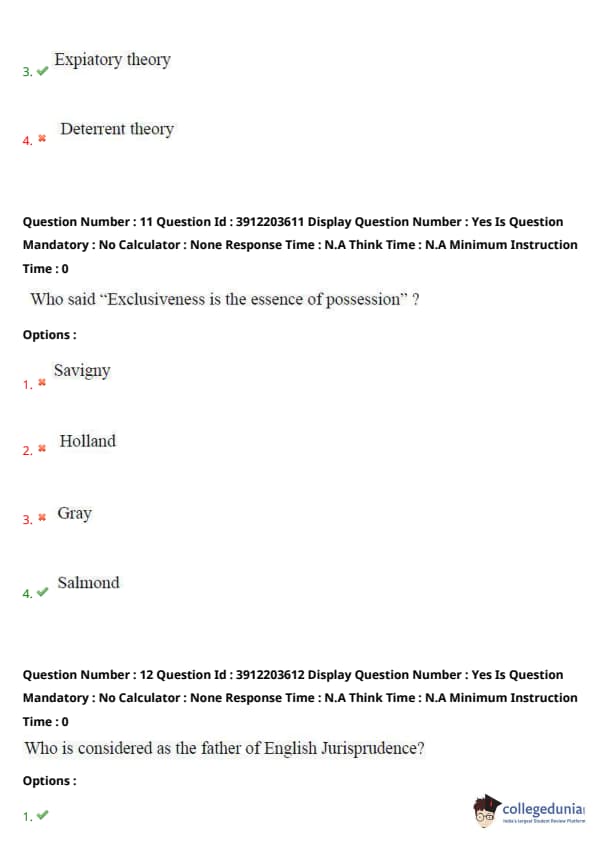
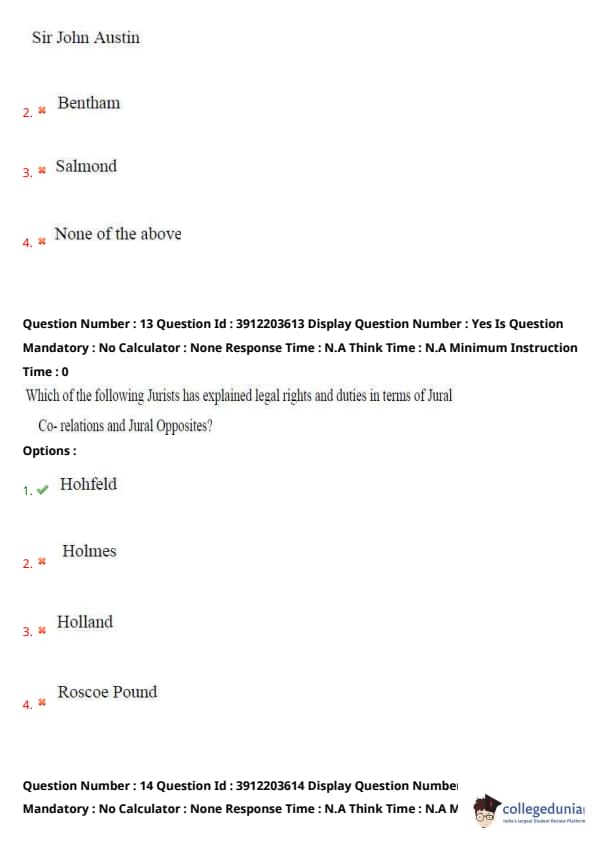
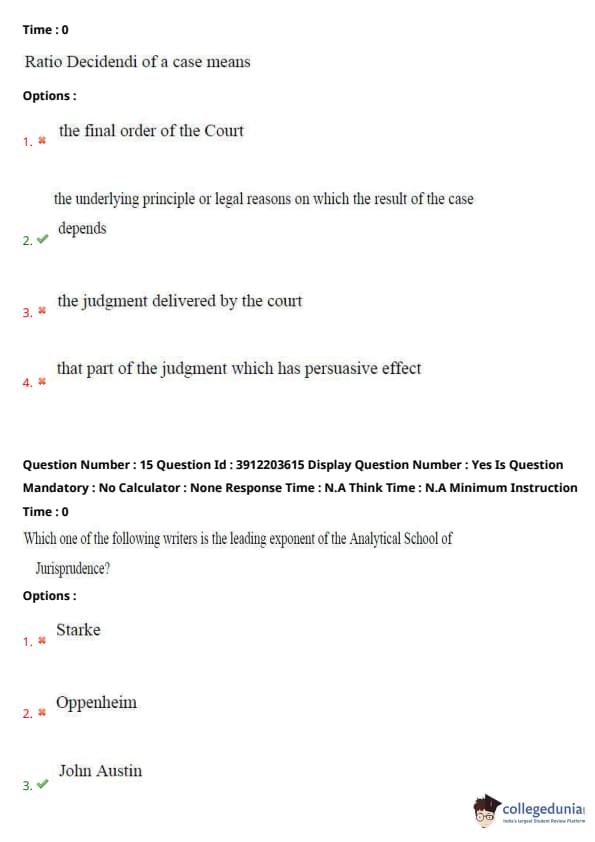
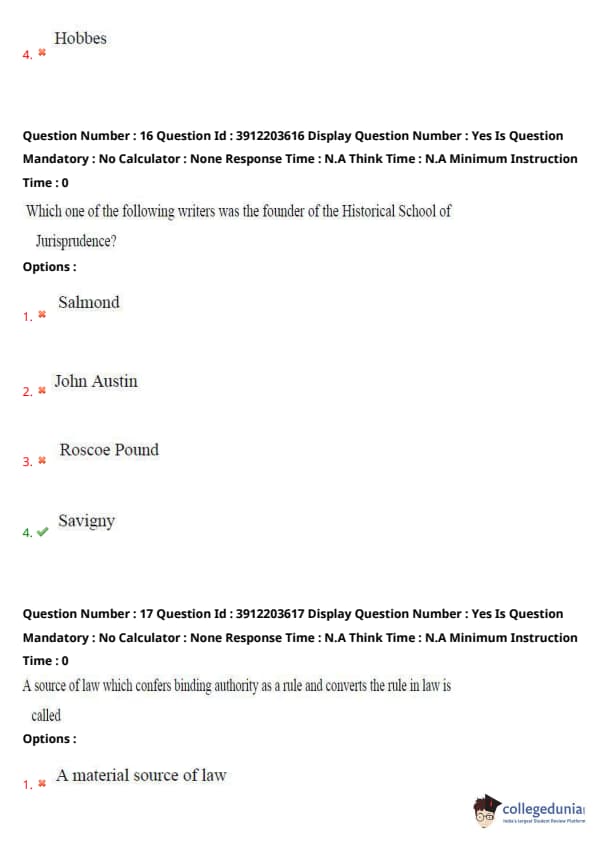
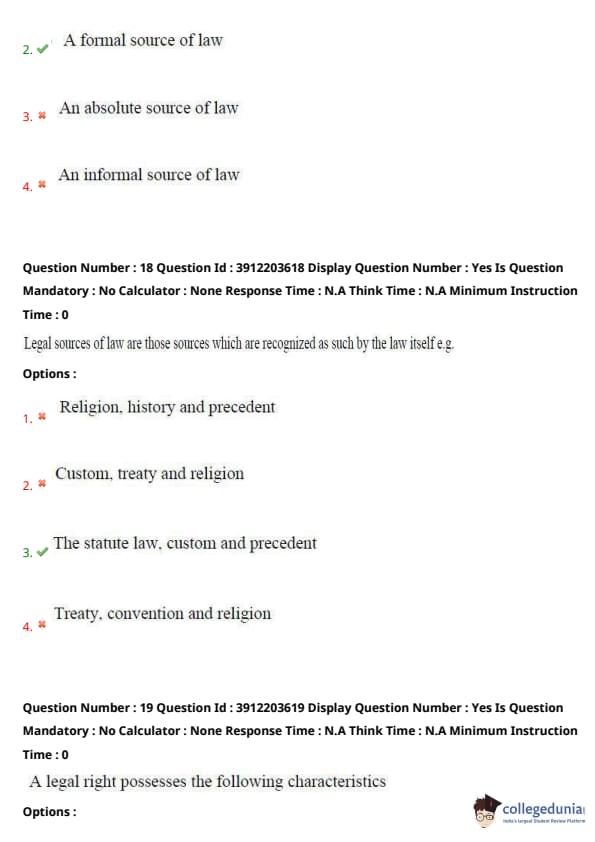
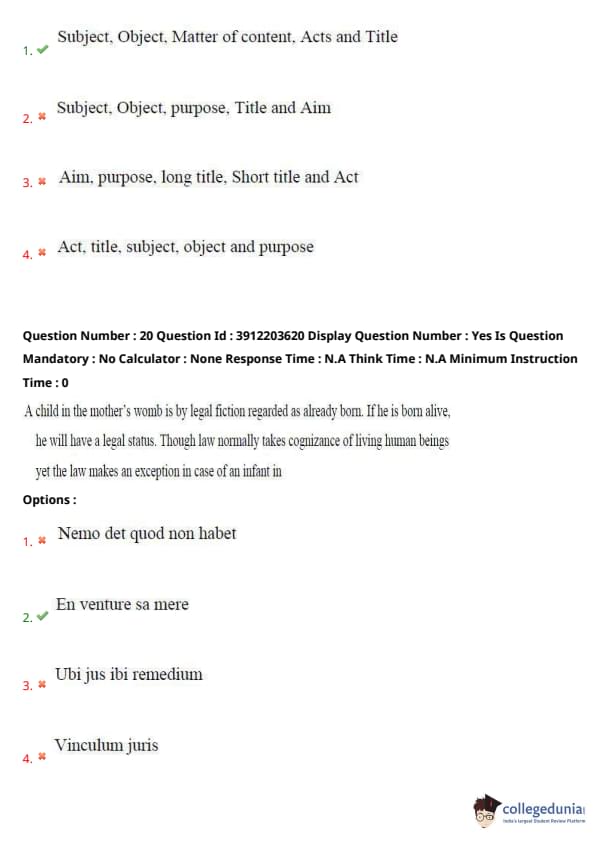
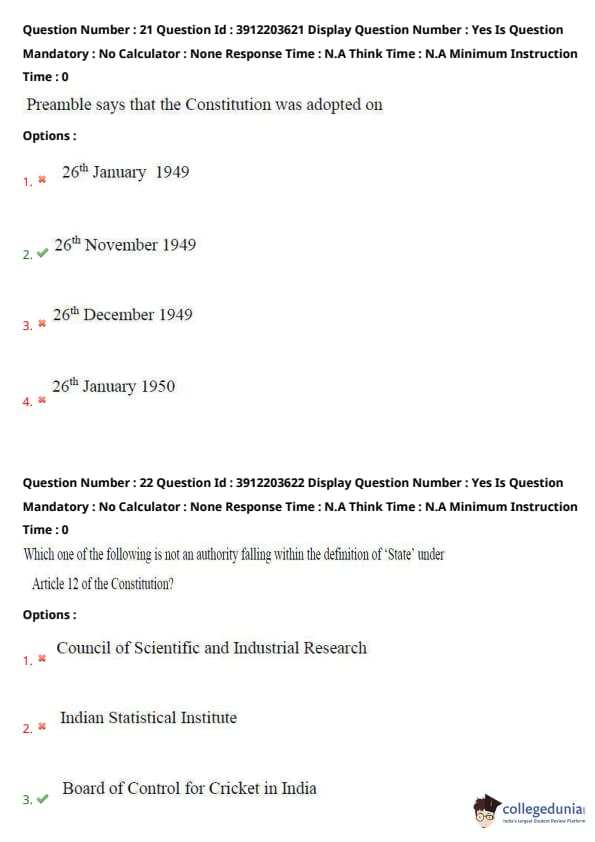
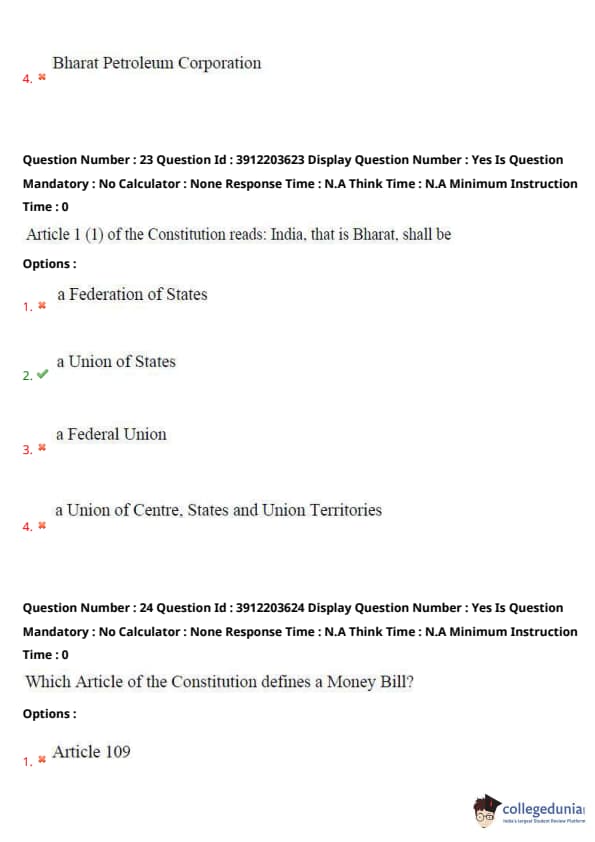
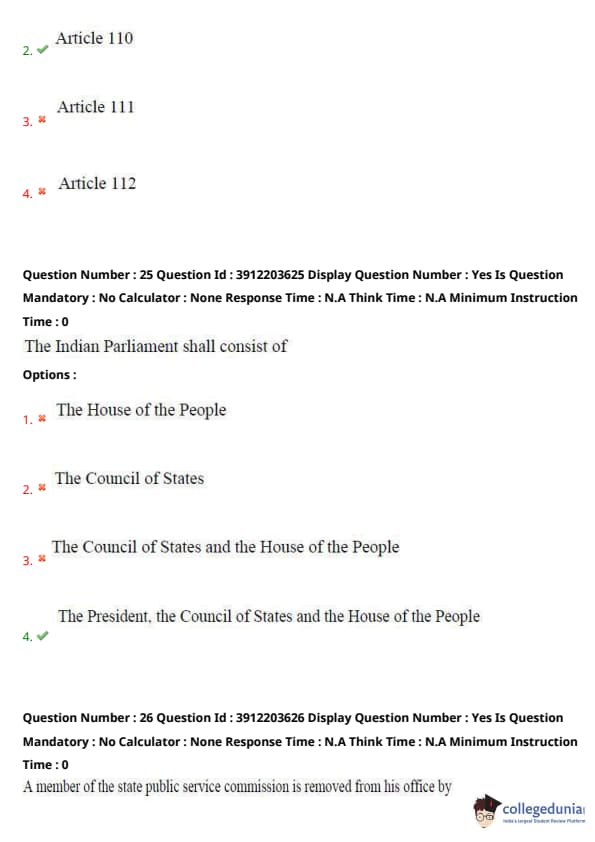
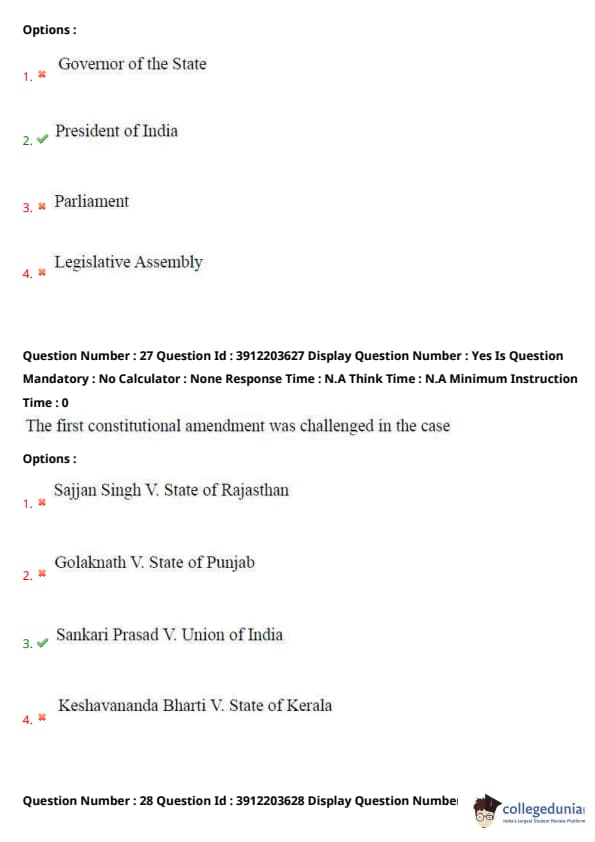
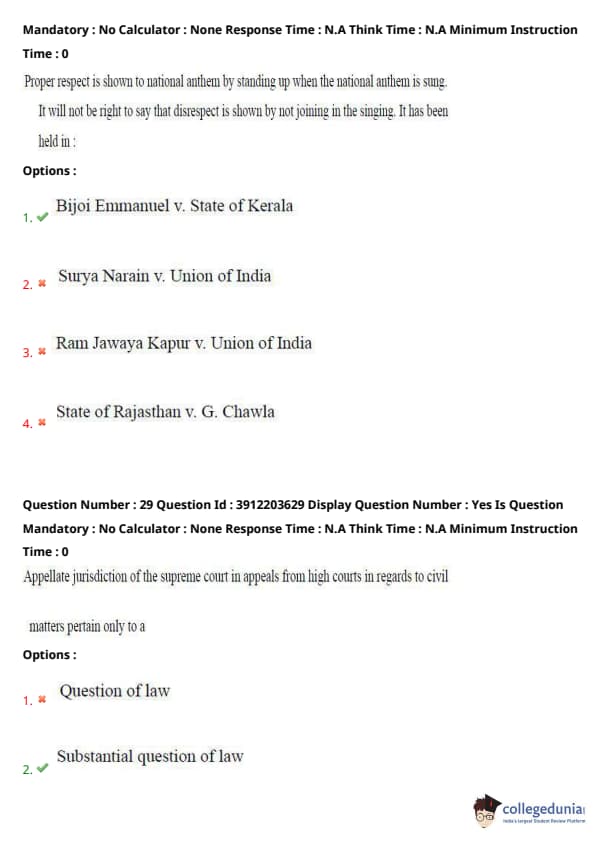
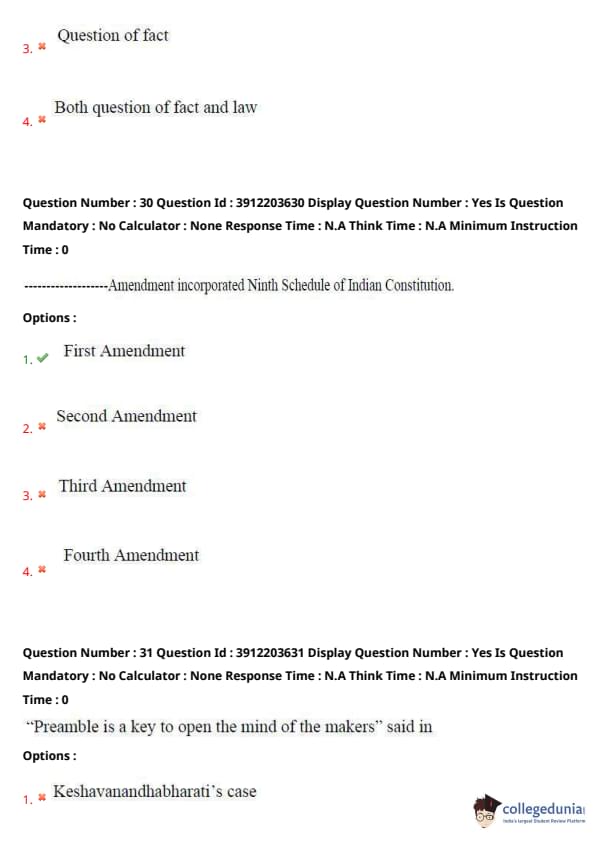
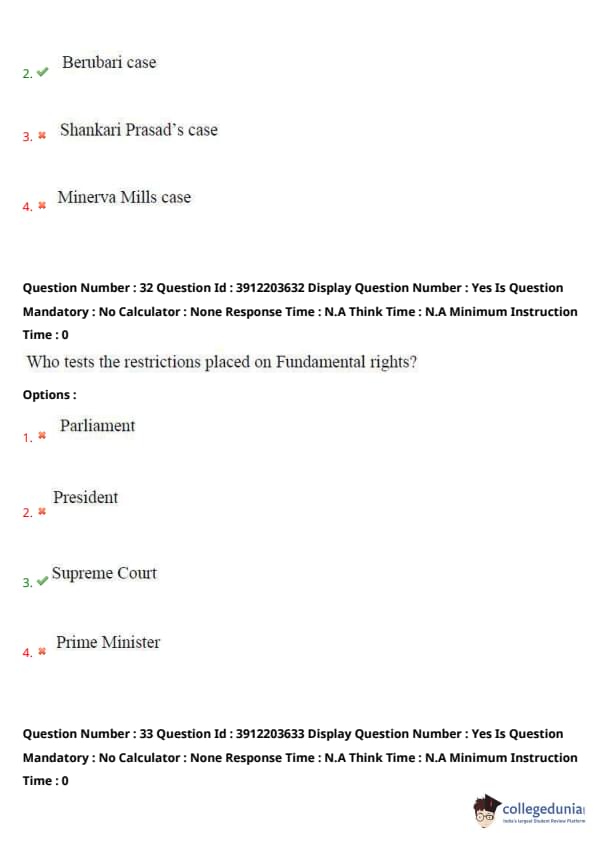
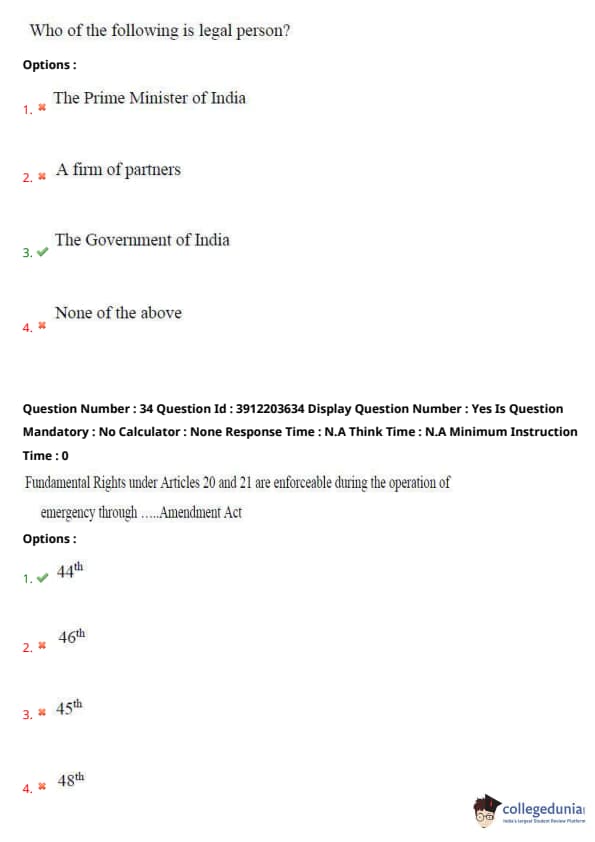
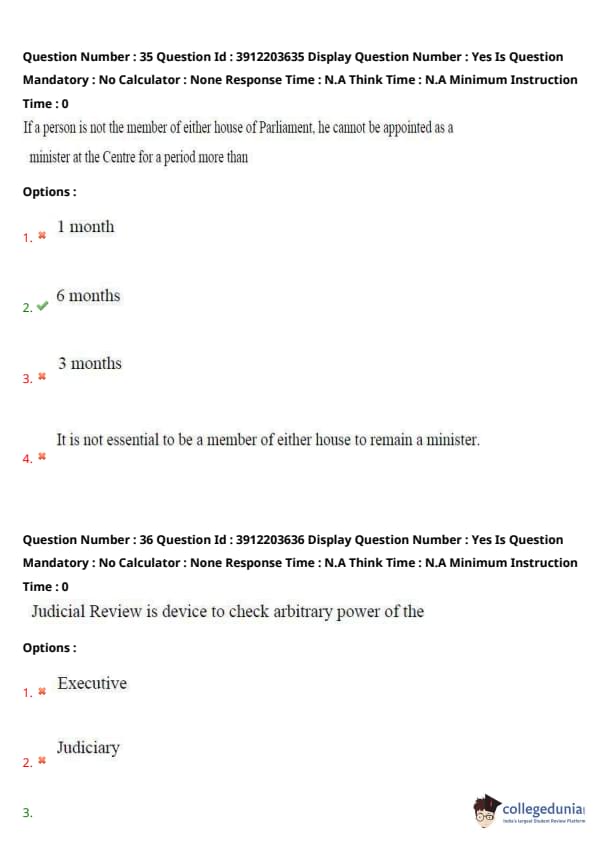
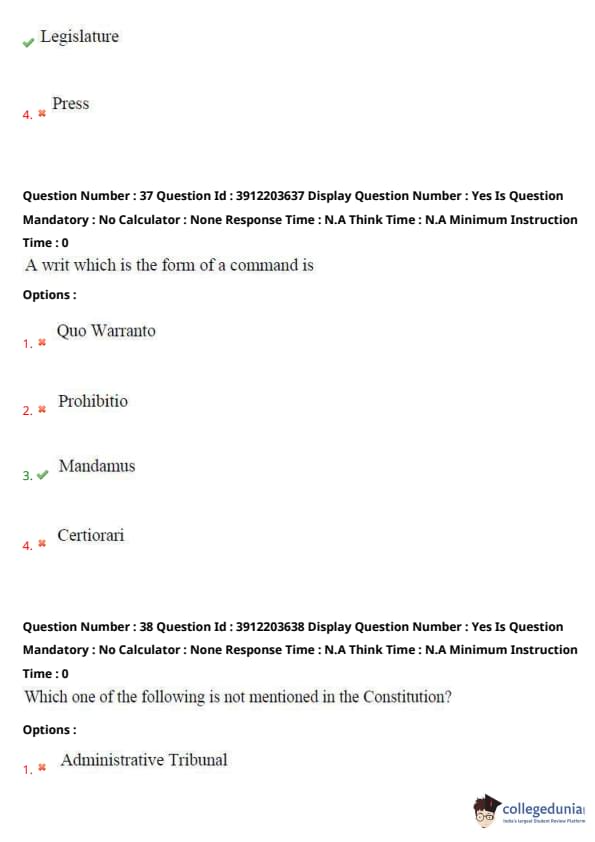
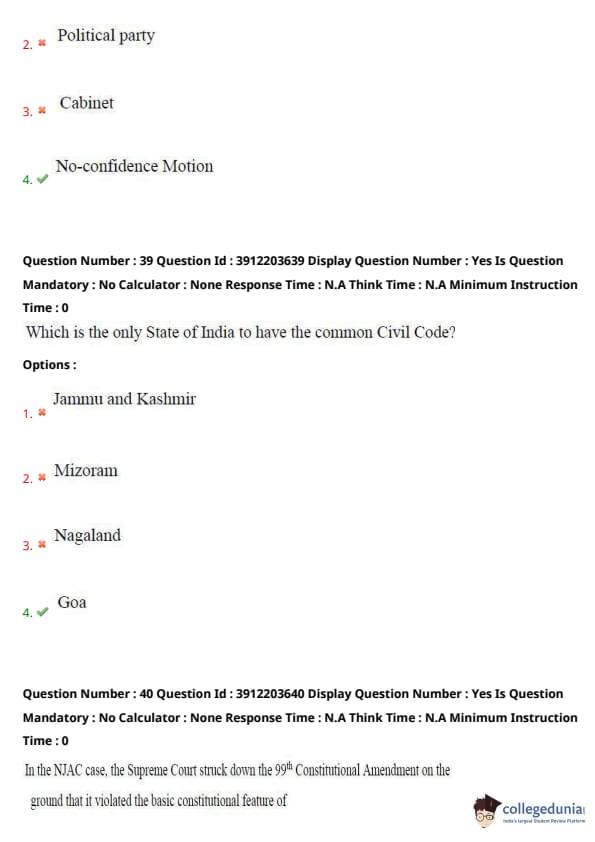
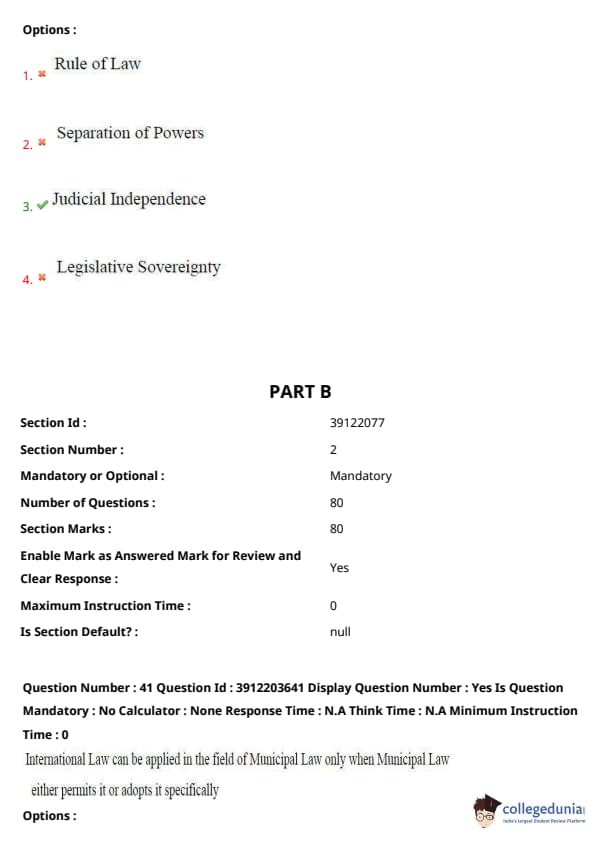
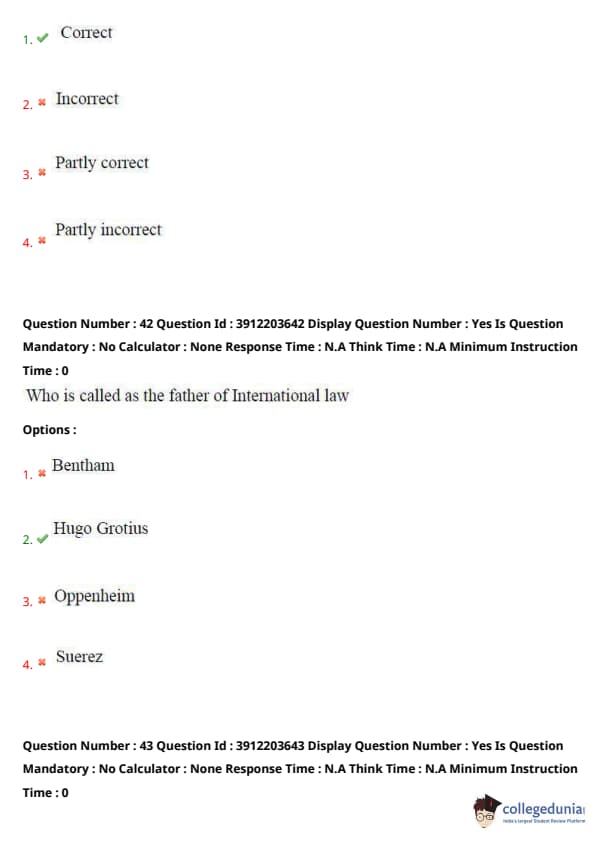
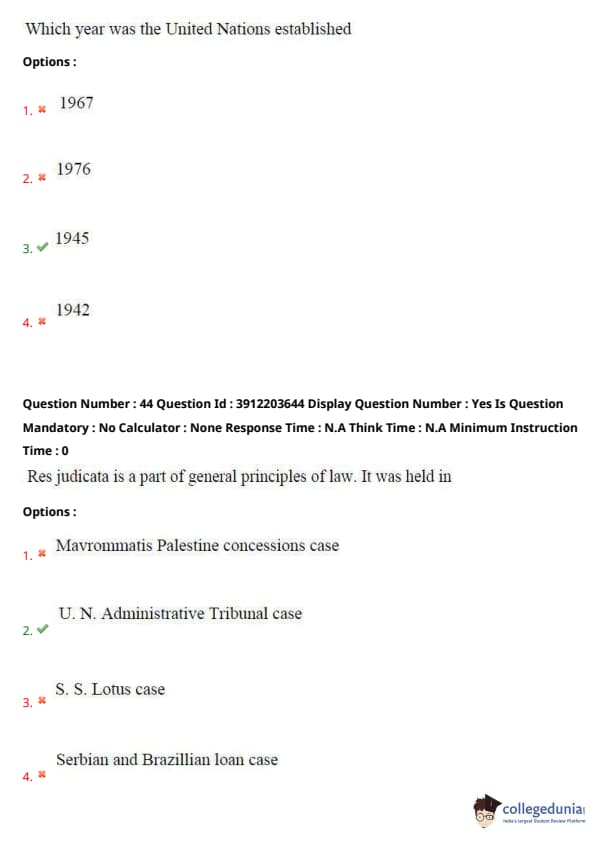
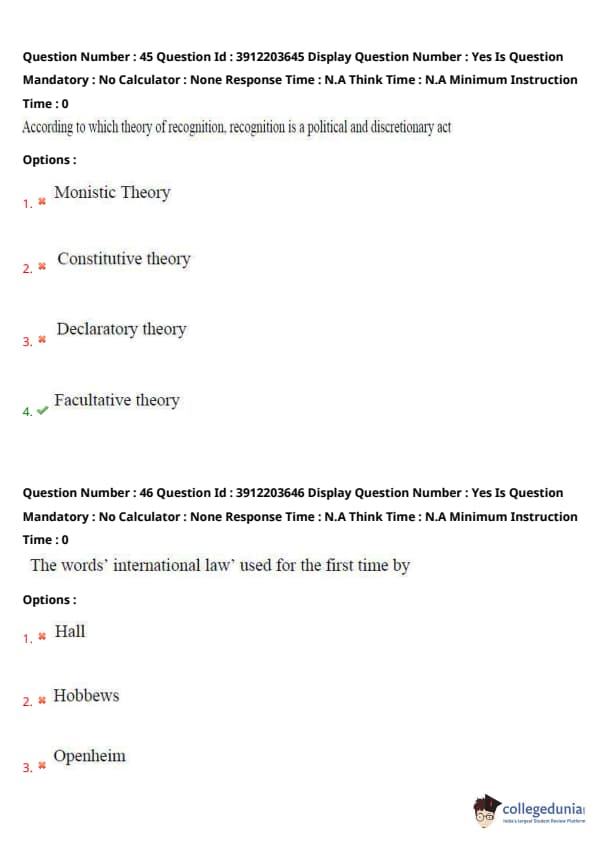
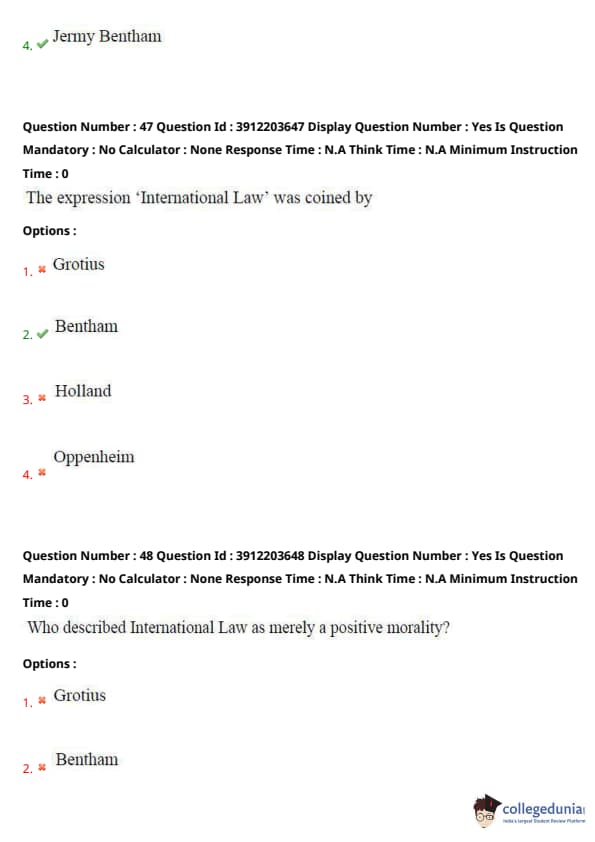
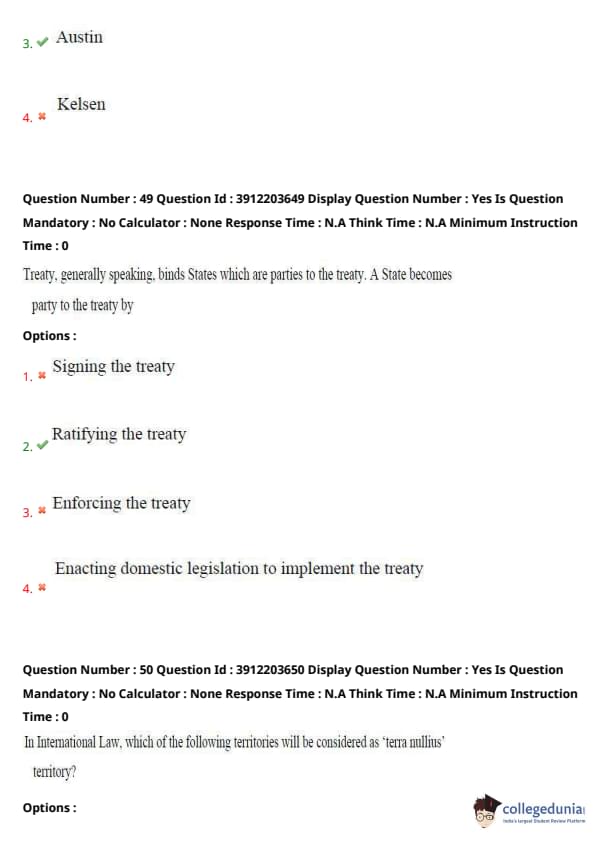
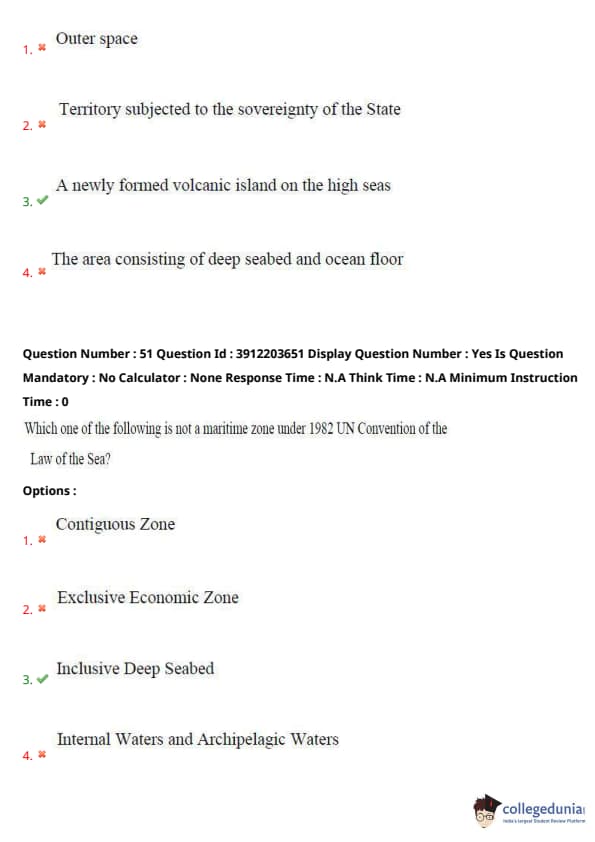
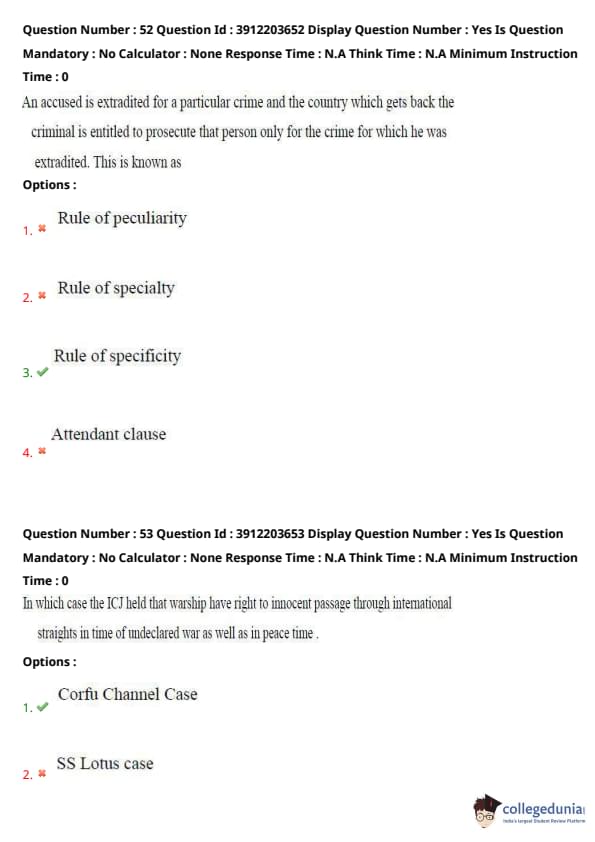
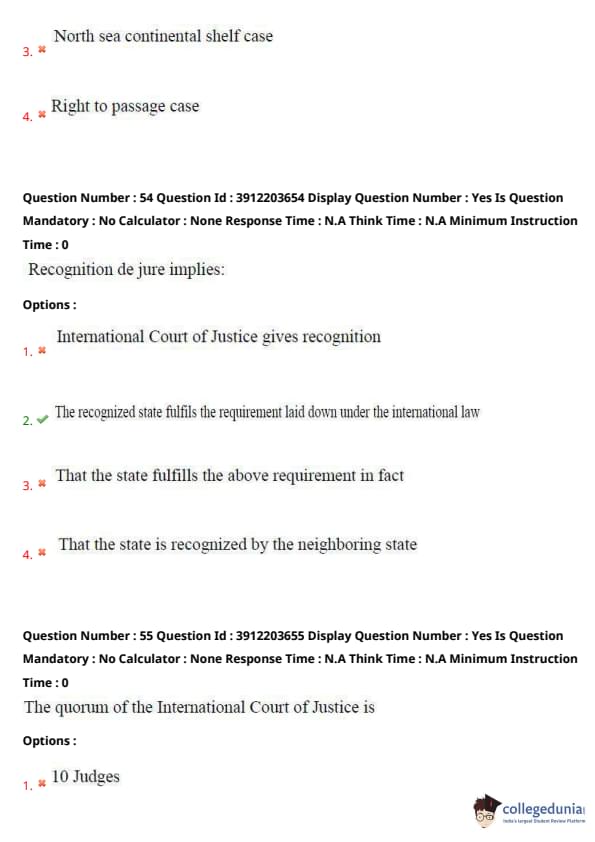
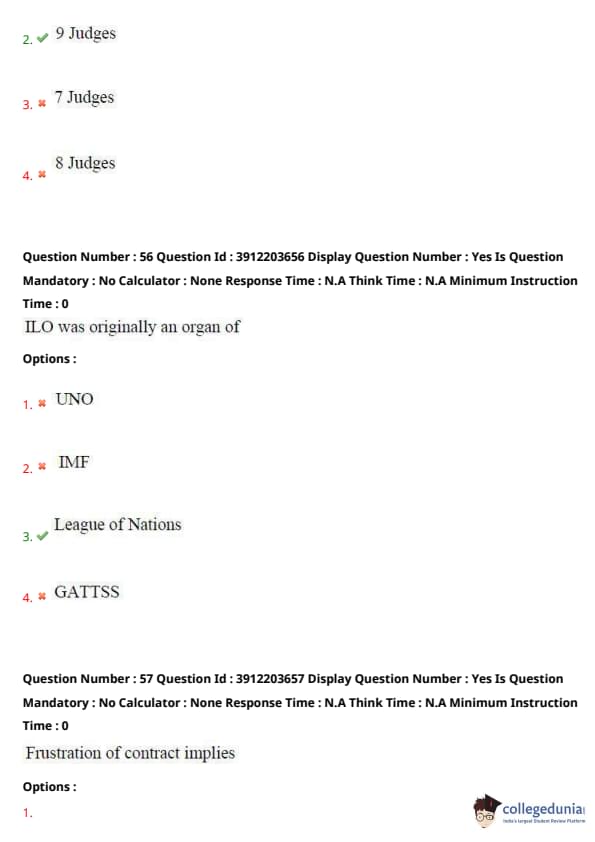
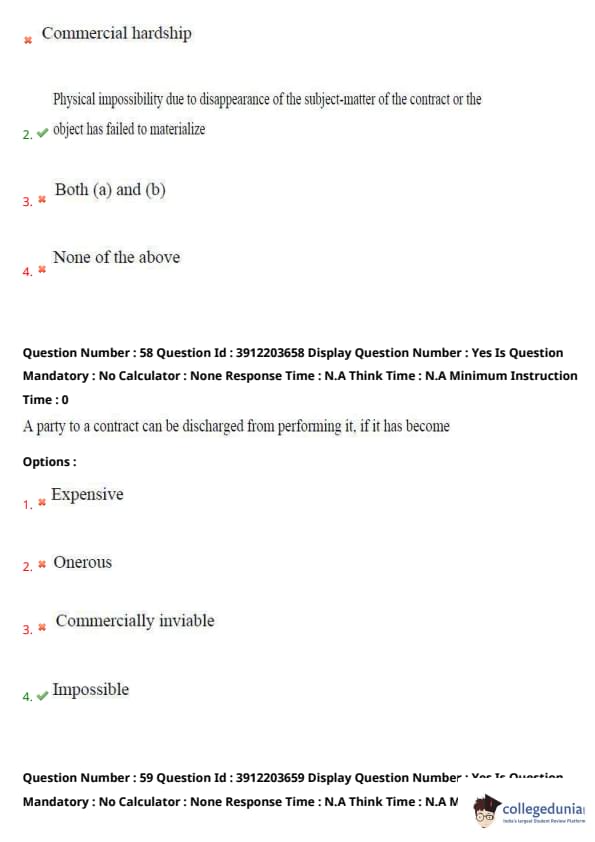
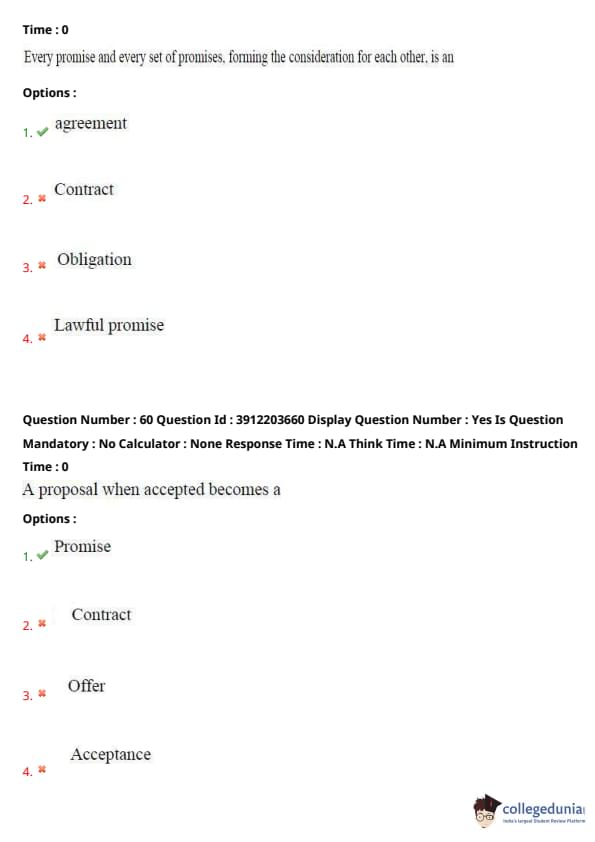
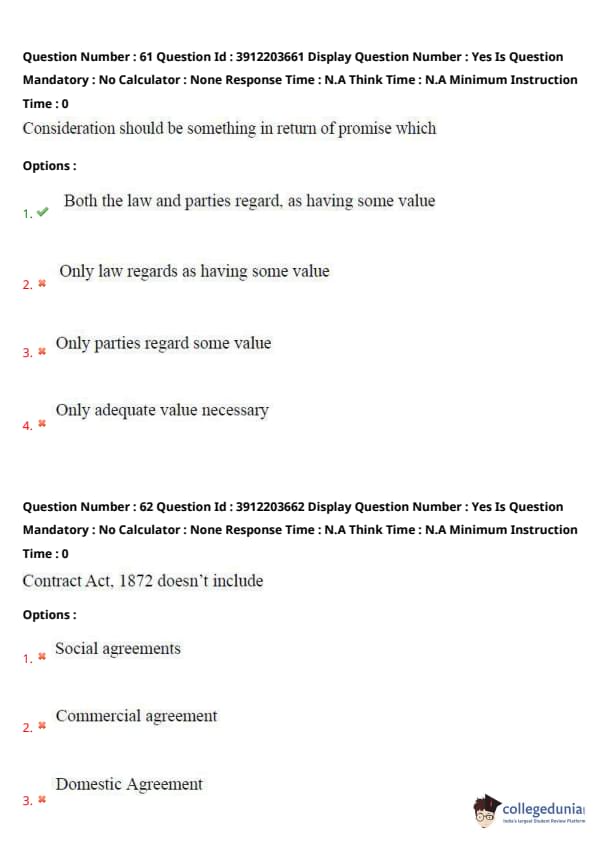
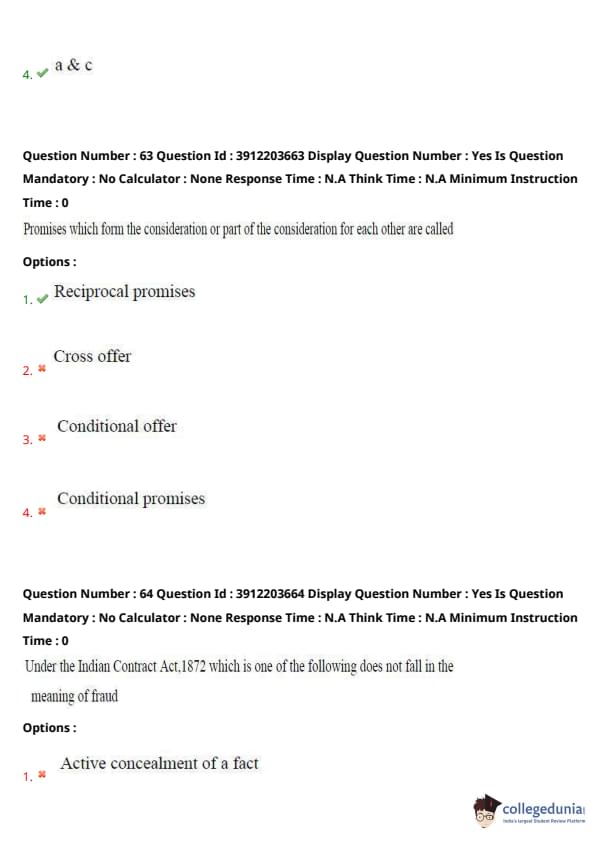
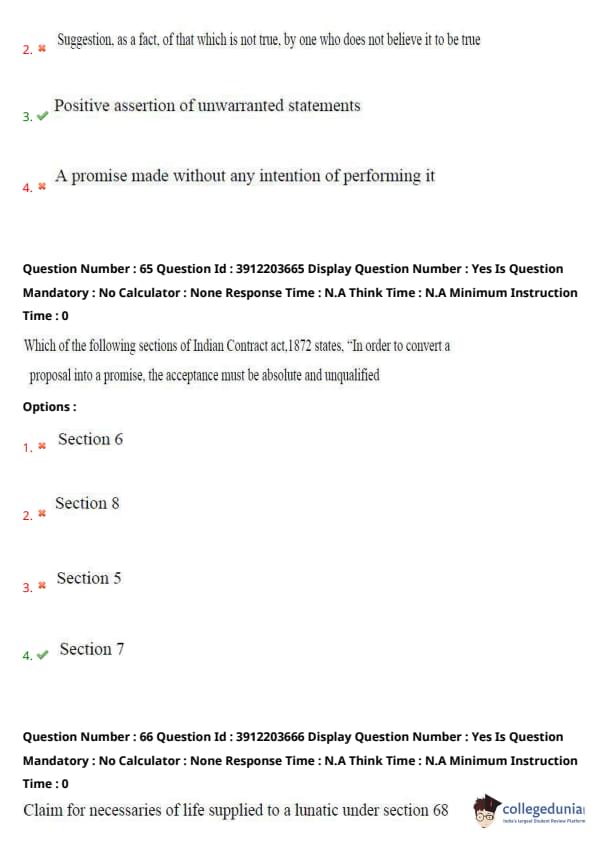
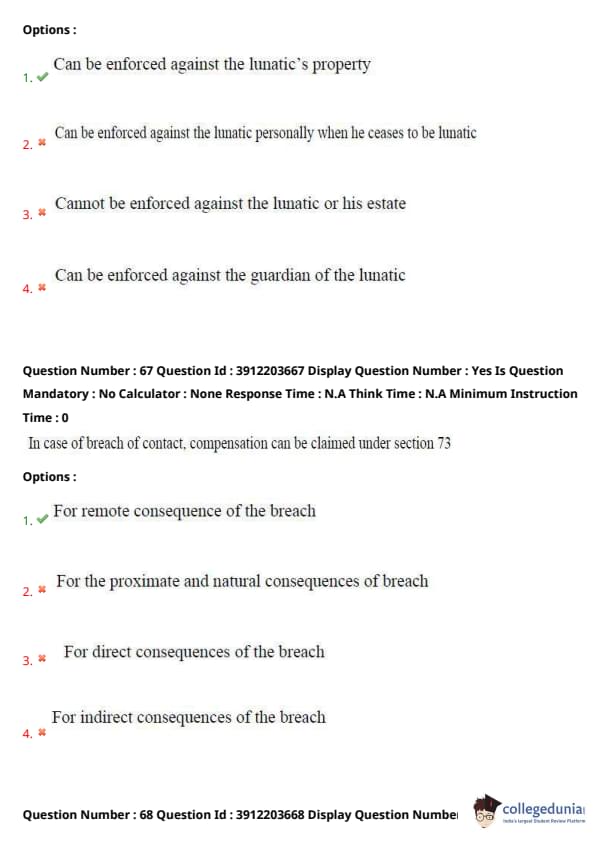
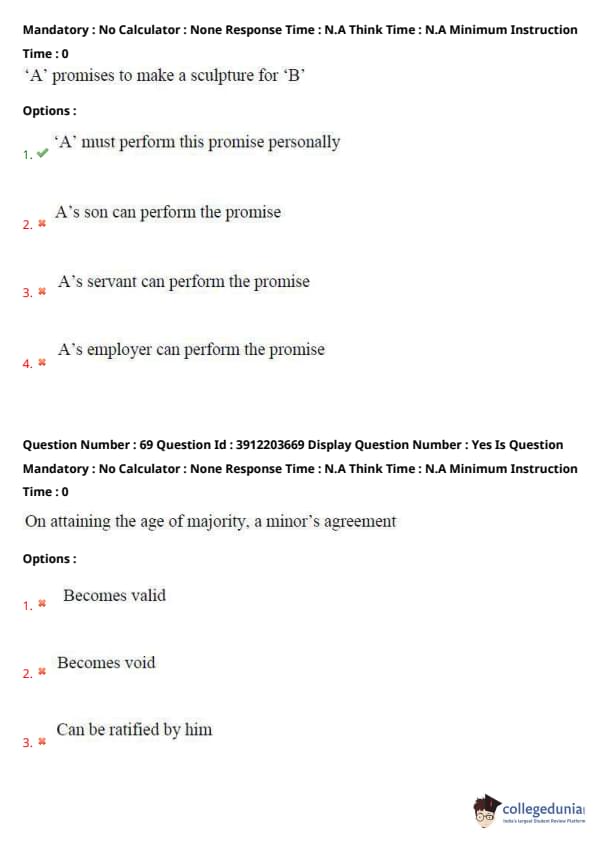
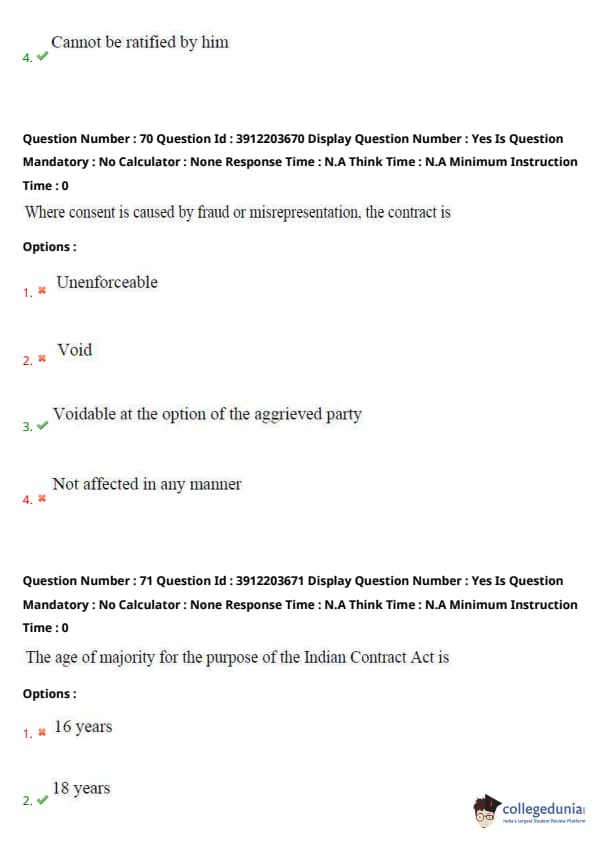
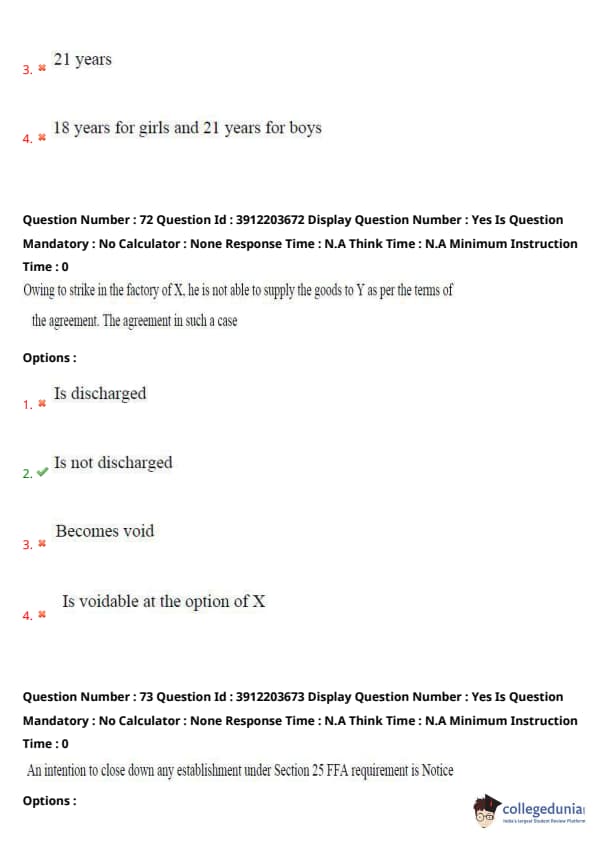
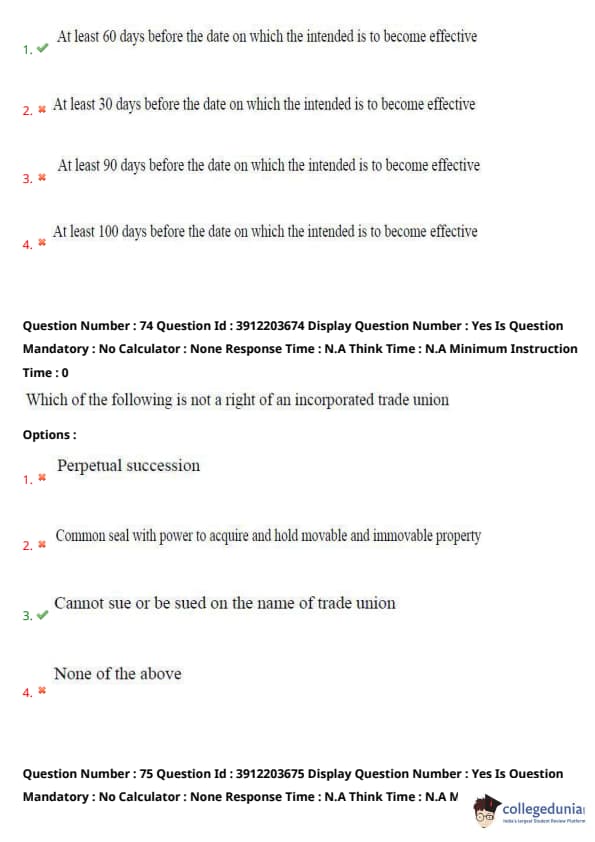
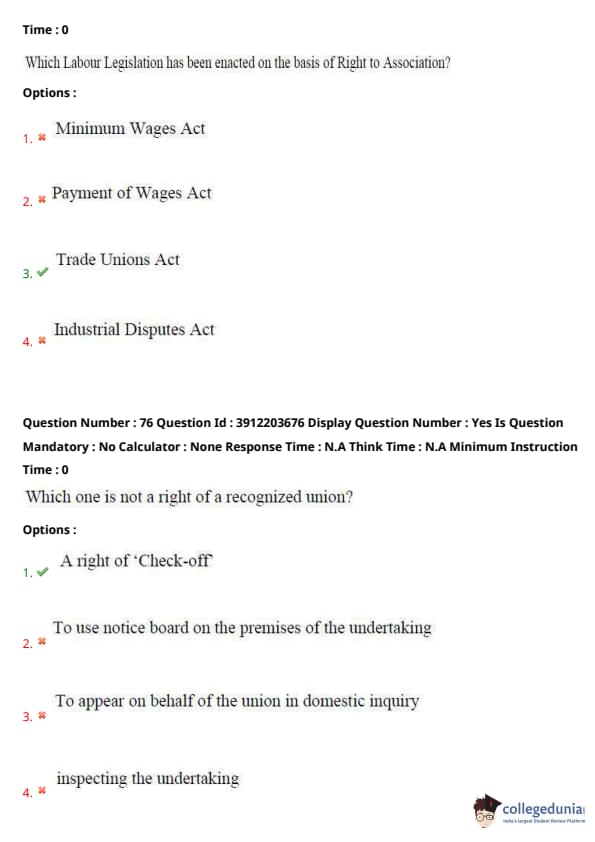
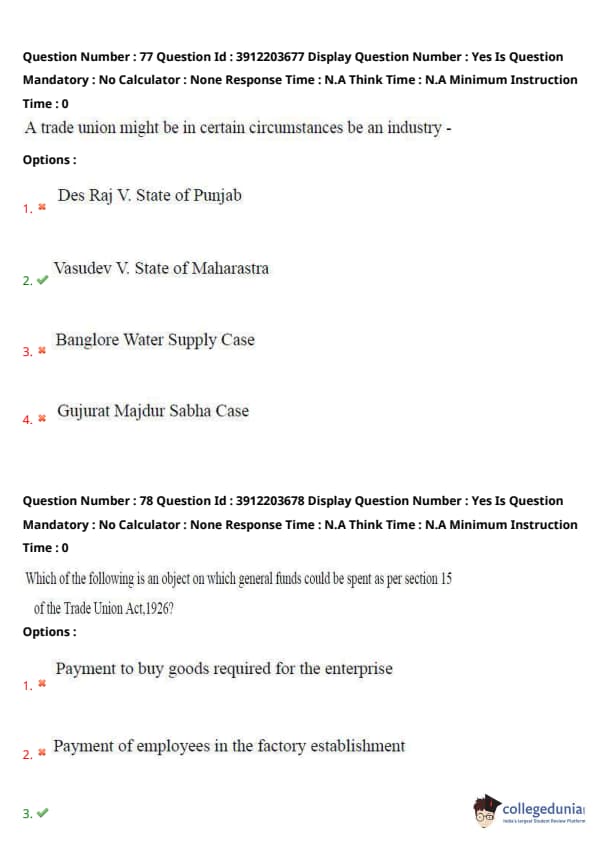
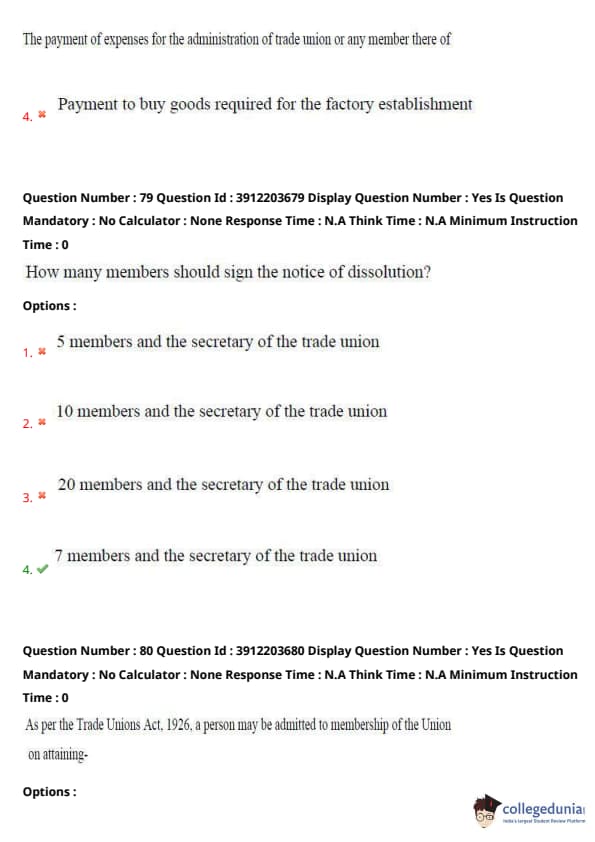
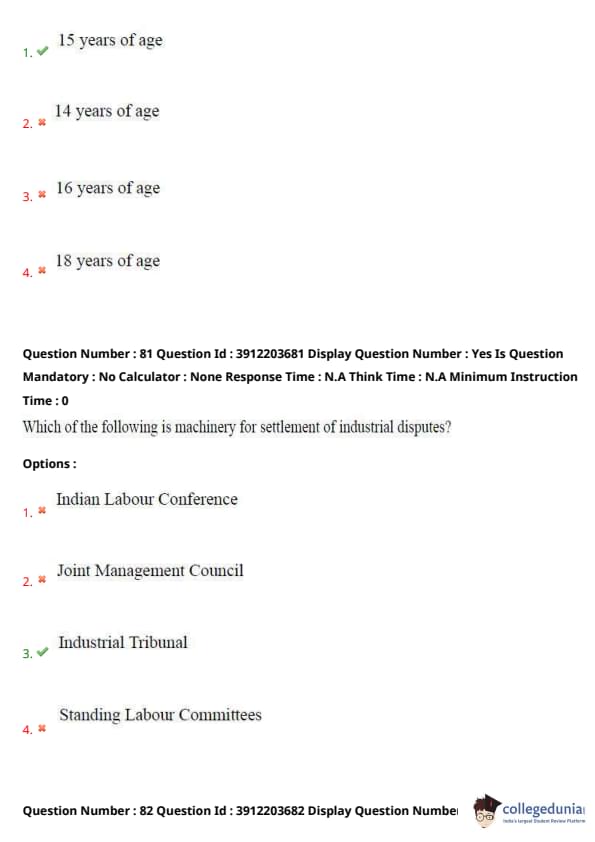
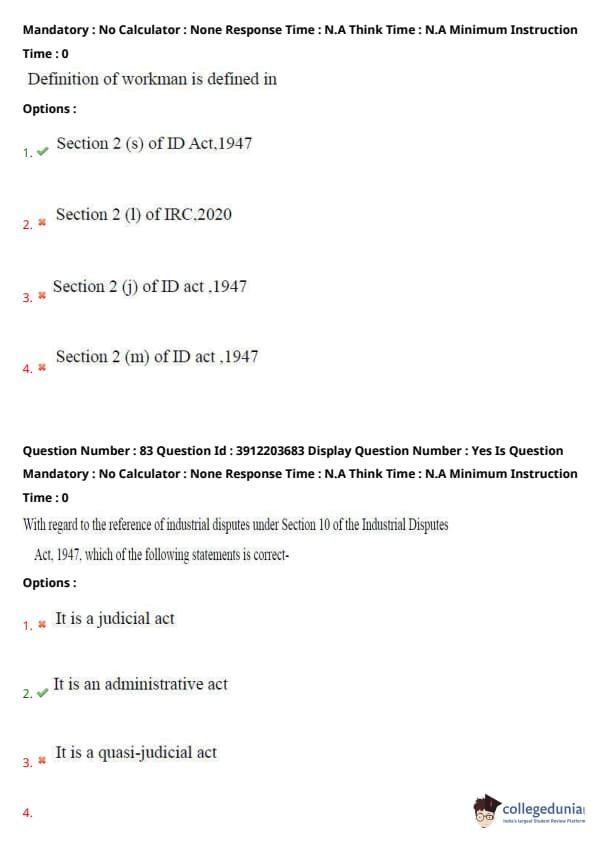
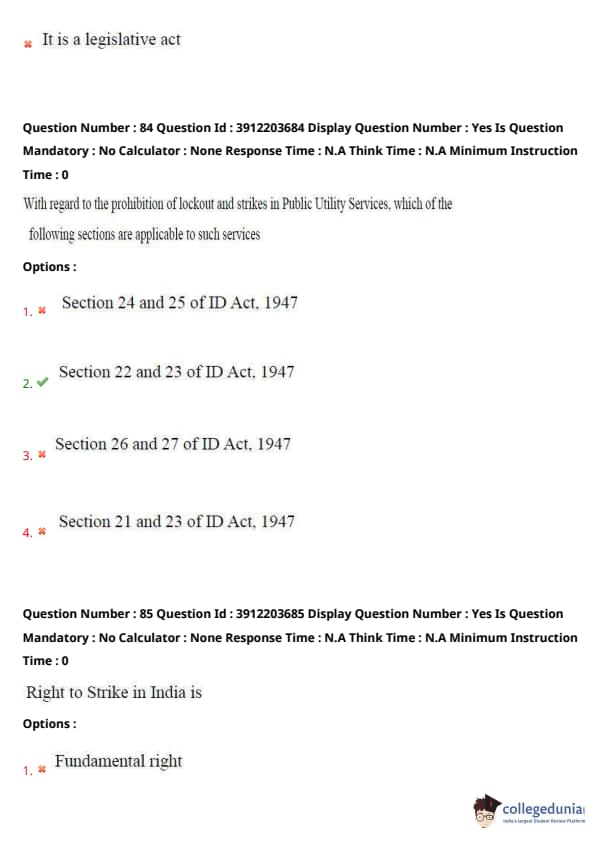
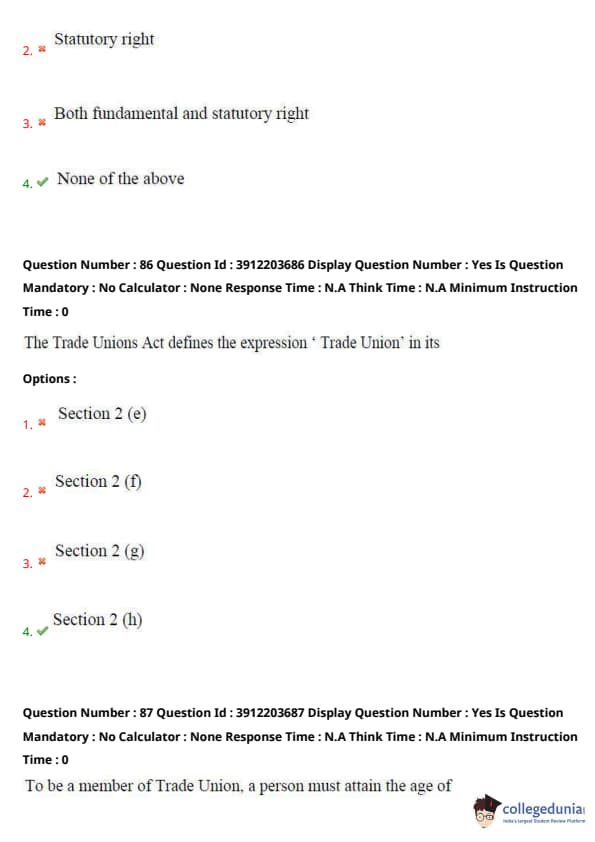
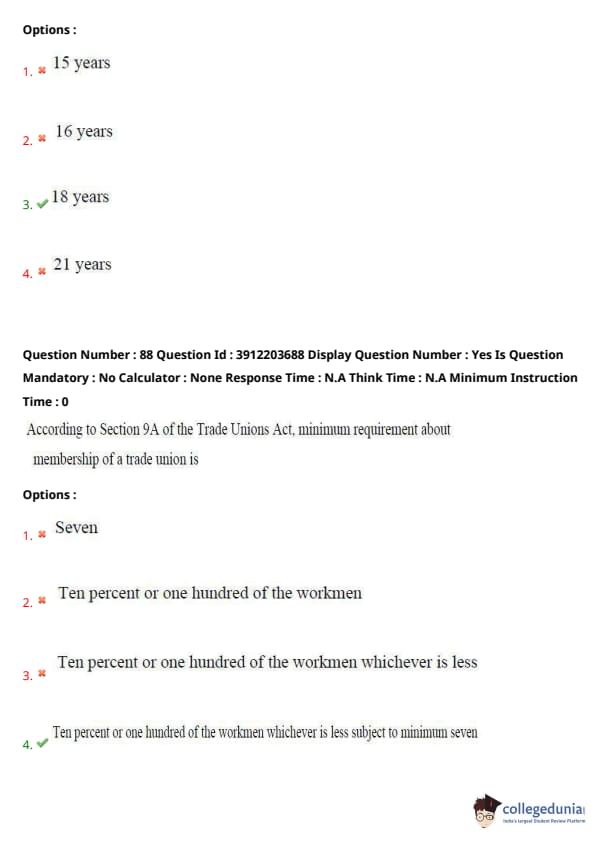
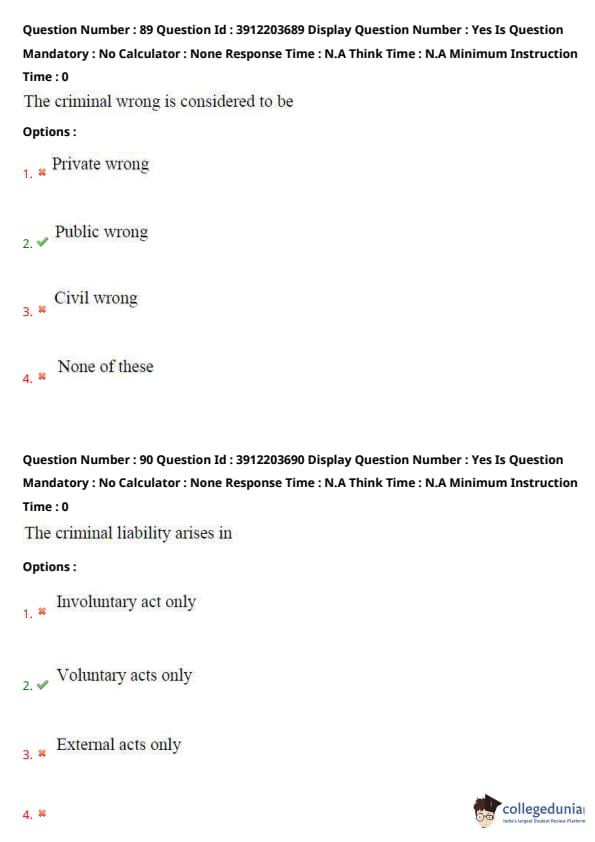
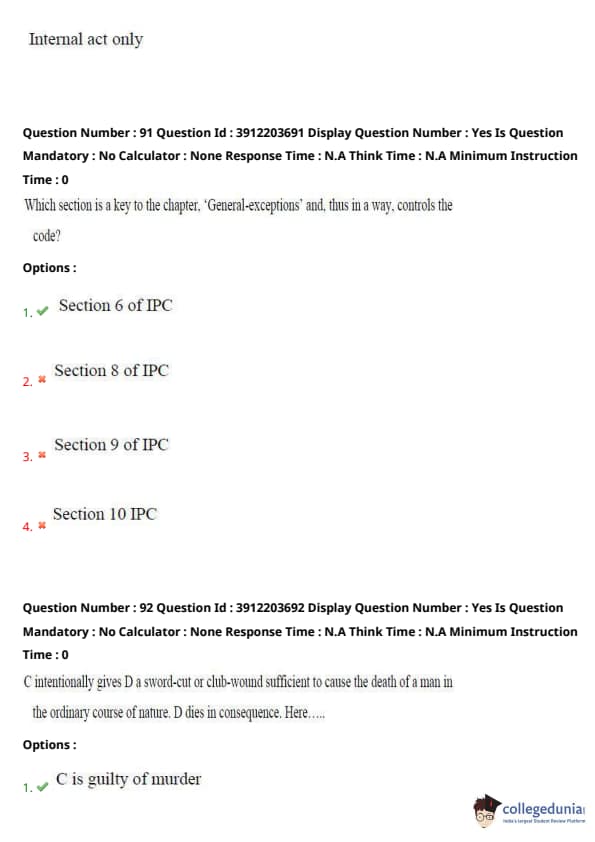
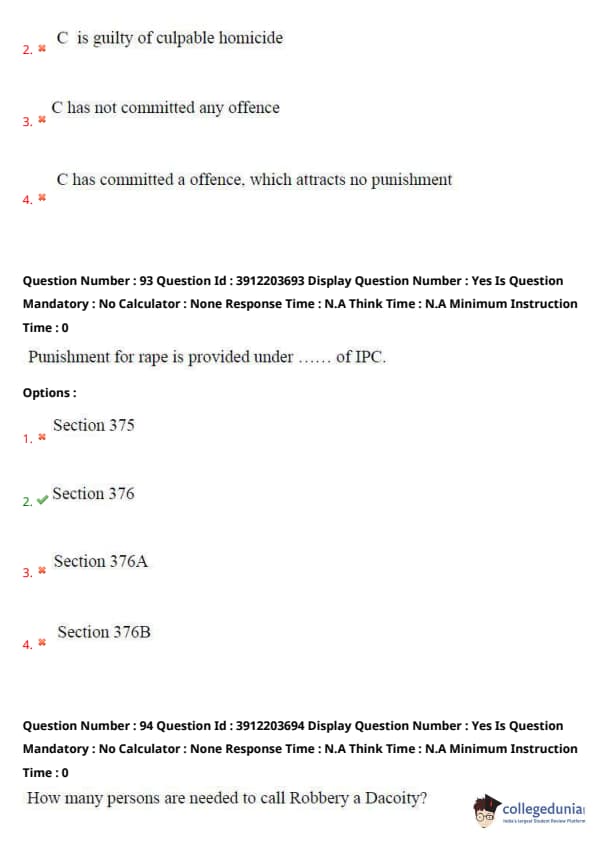
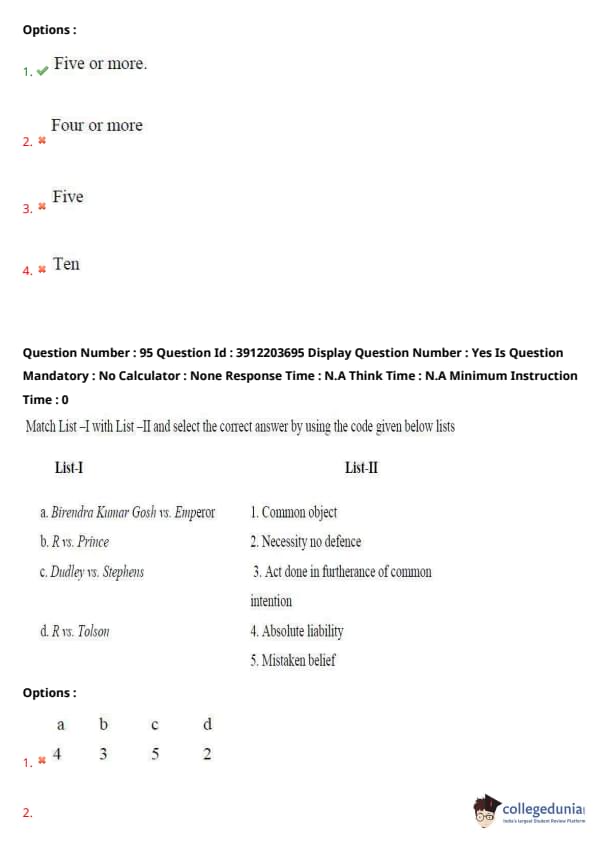
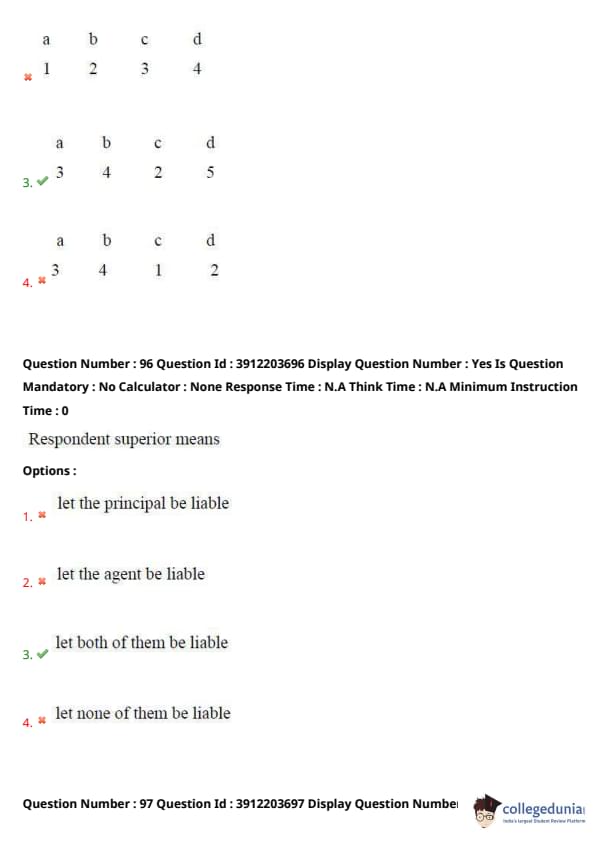
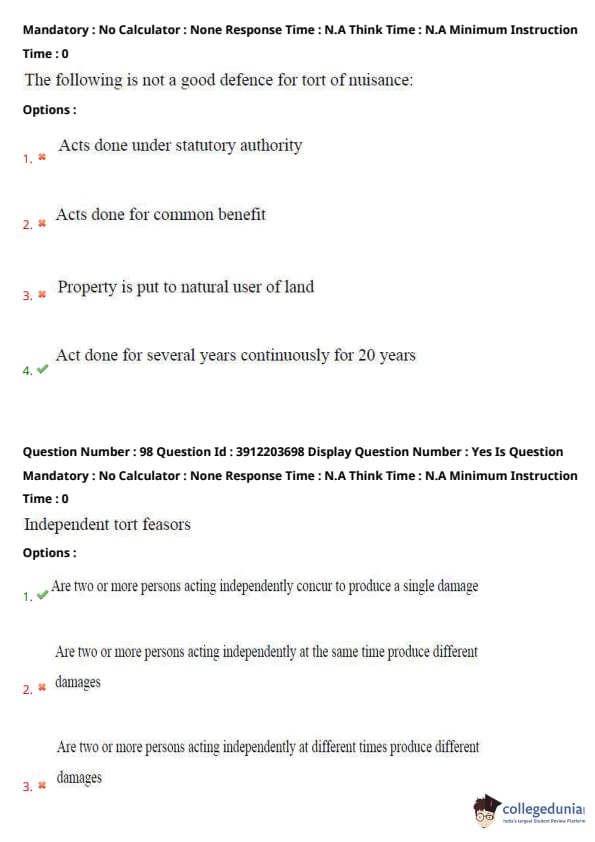
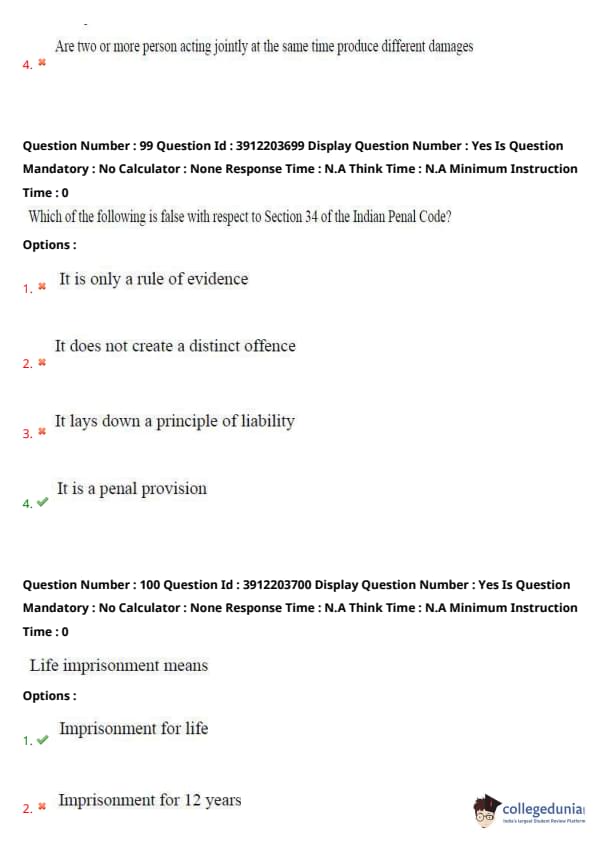
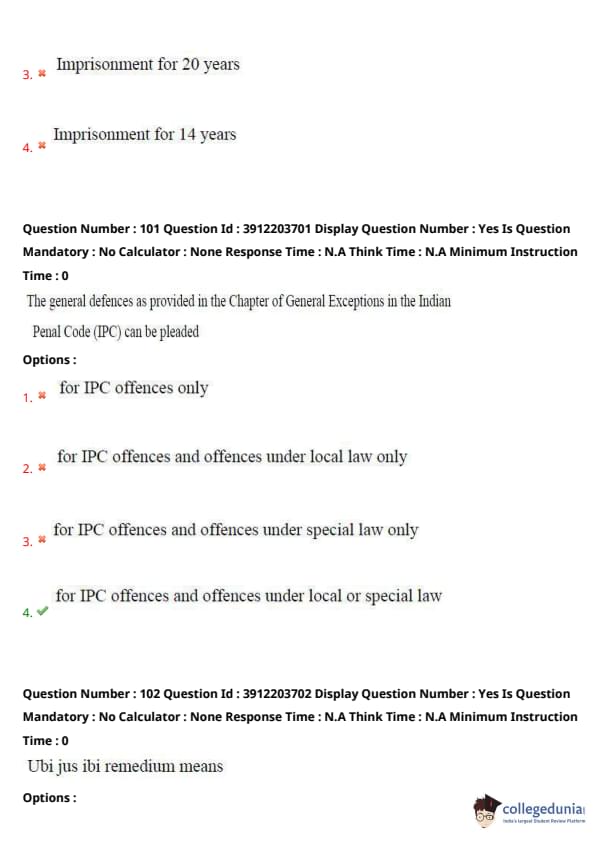
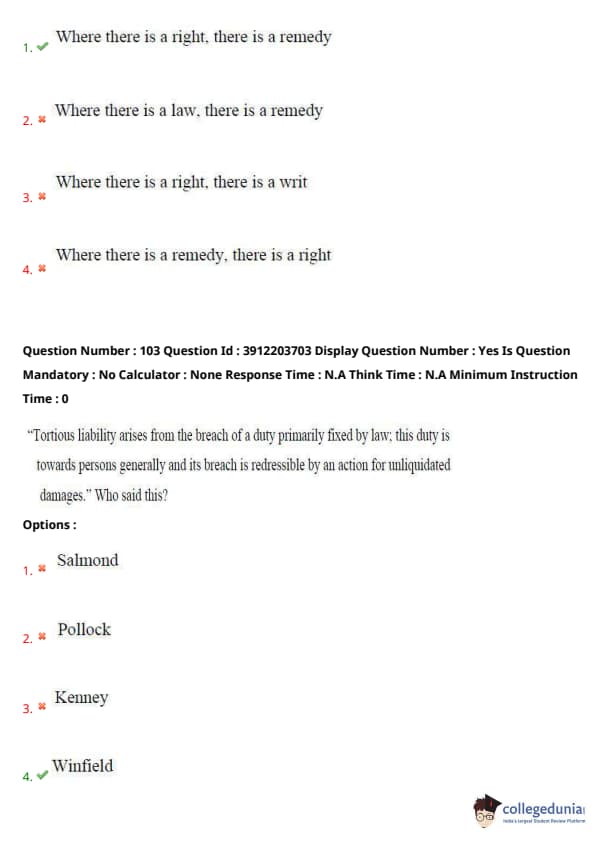
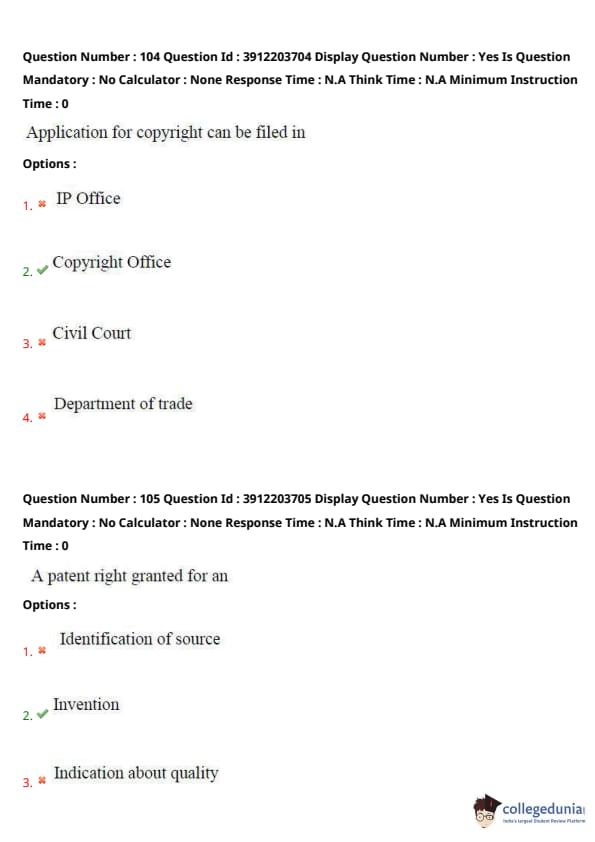
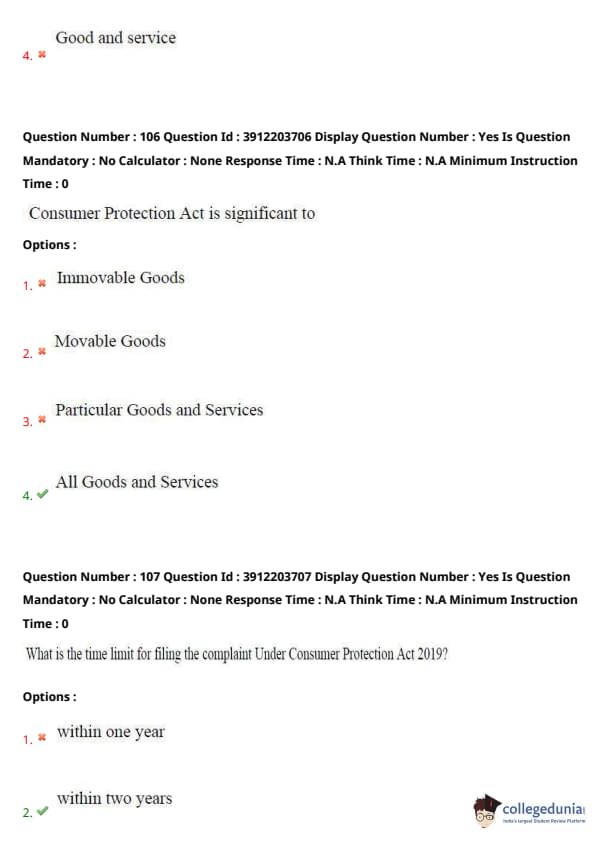
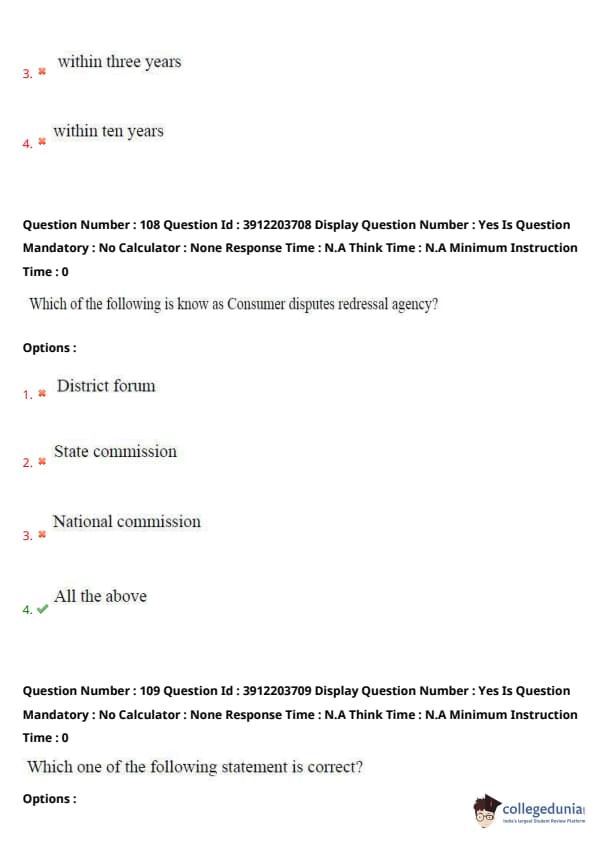
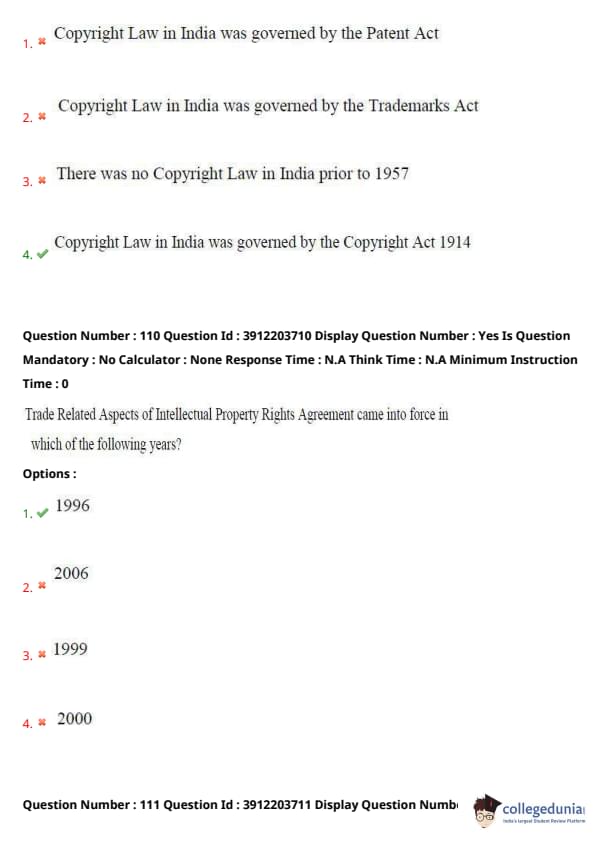
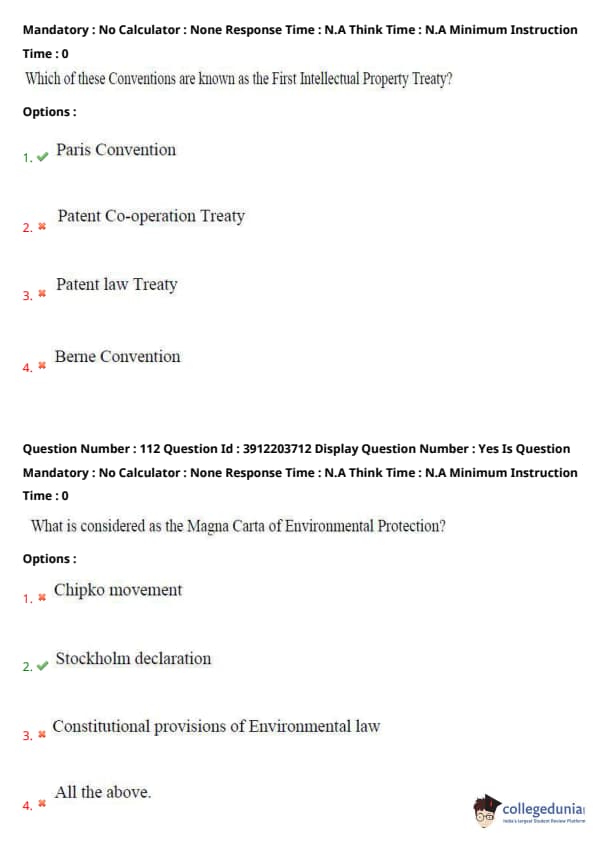
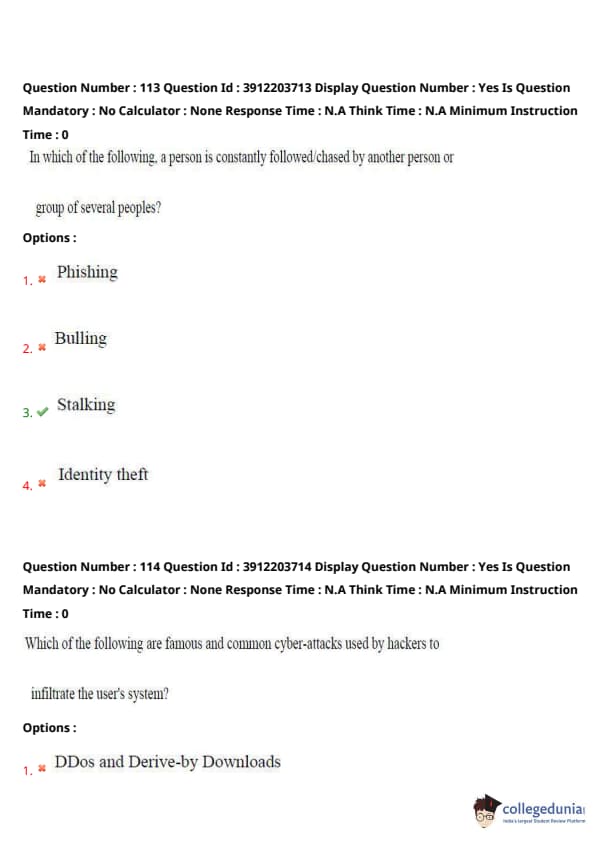
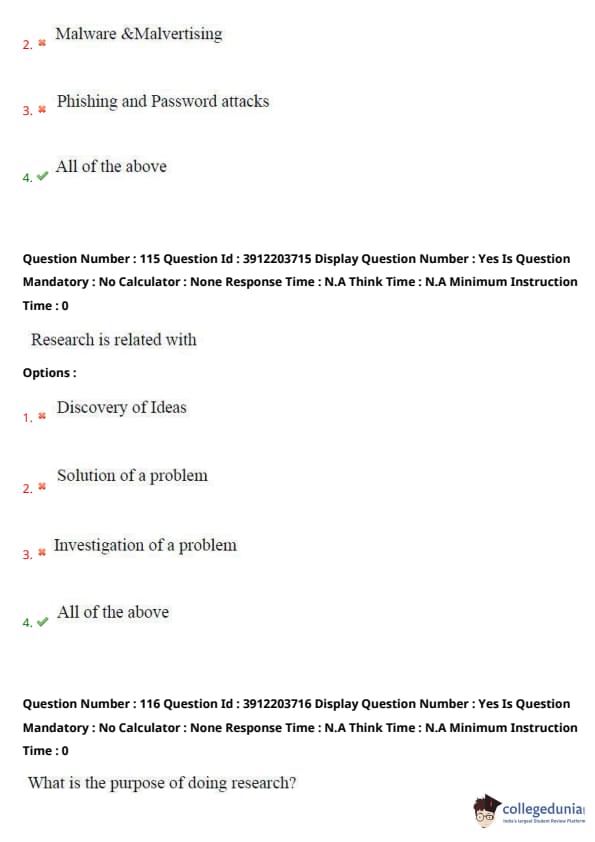
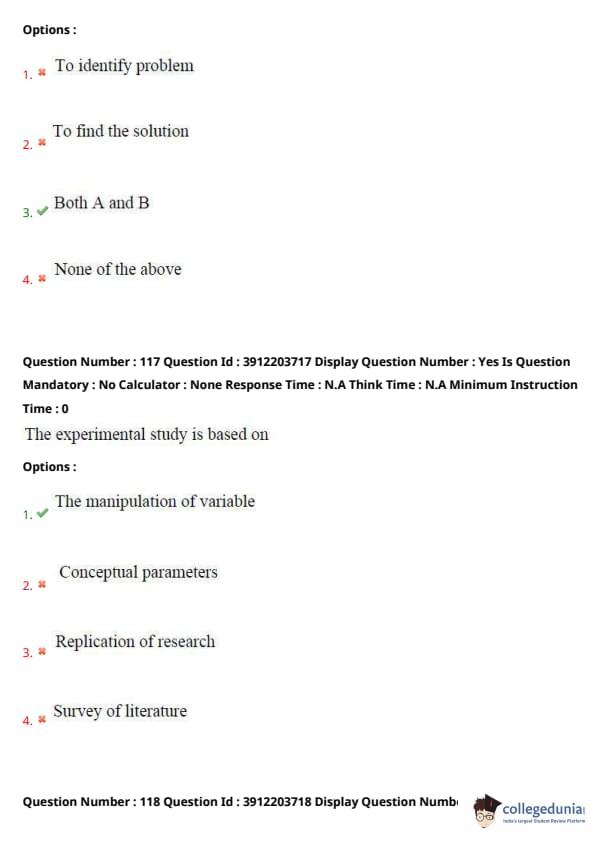
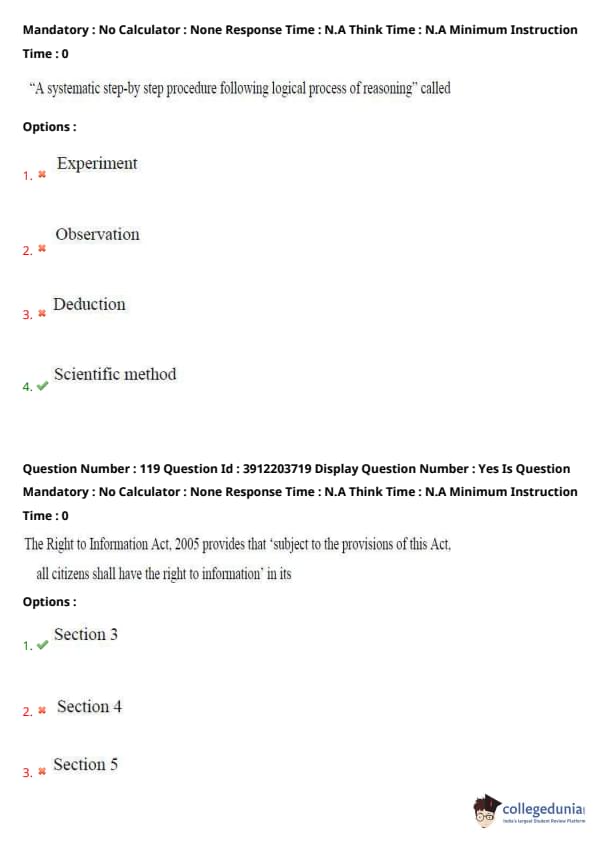
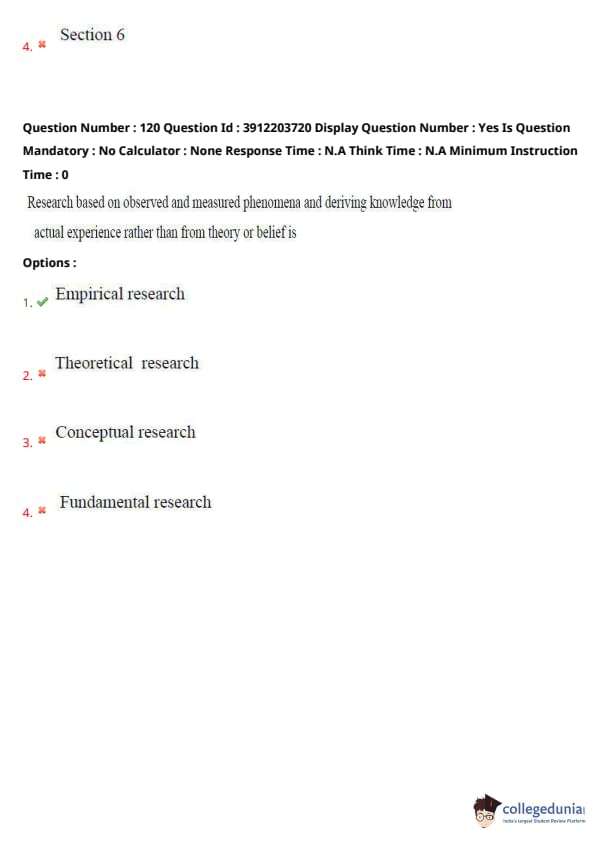




Comments